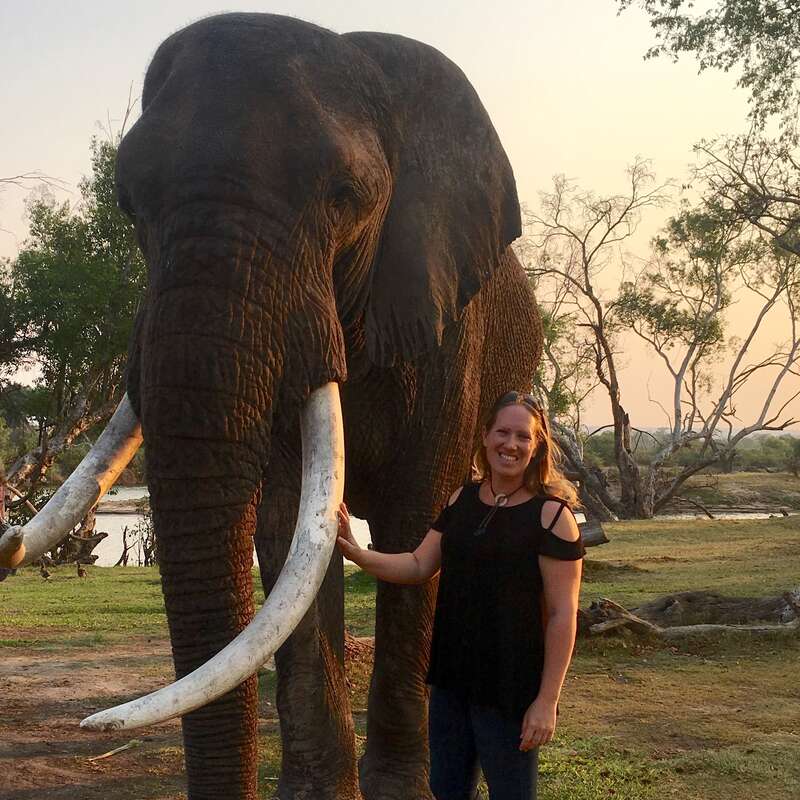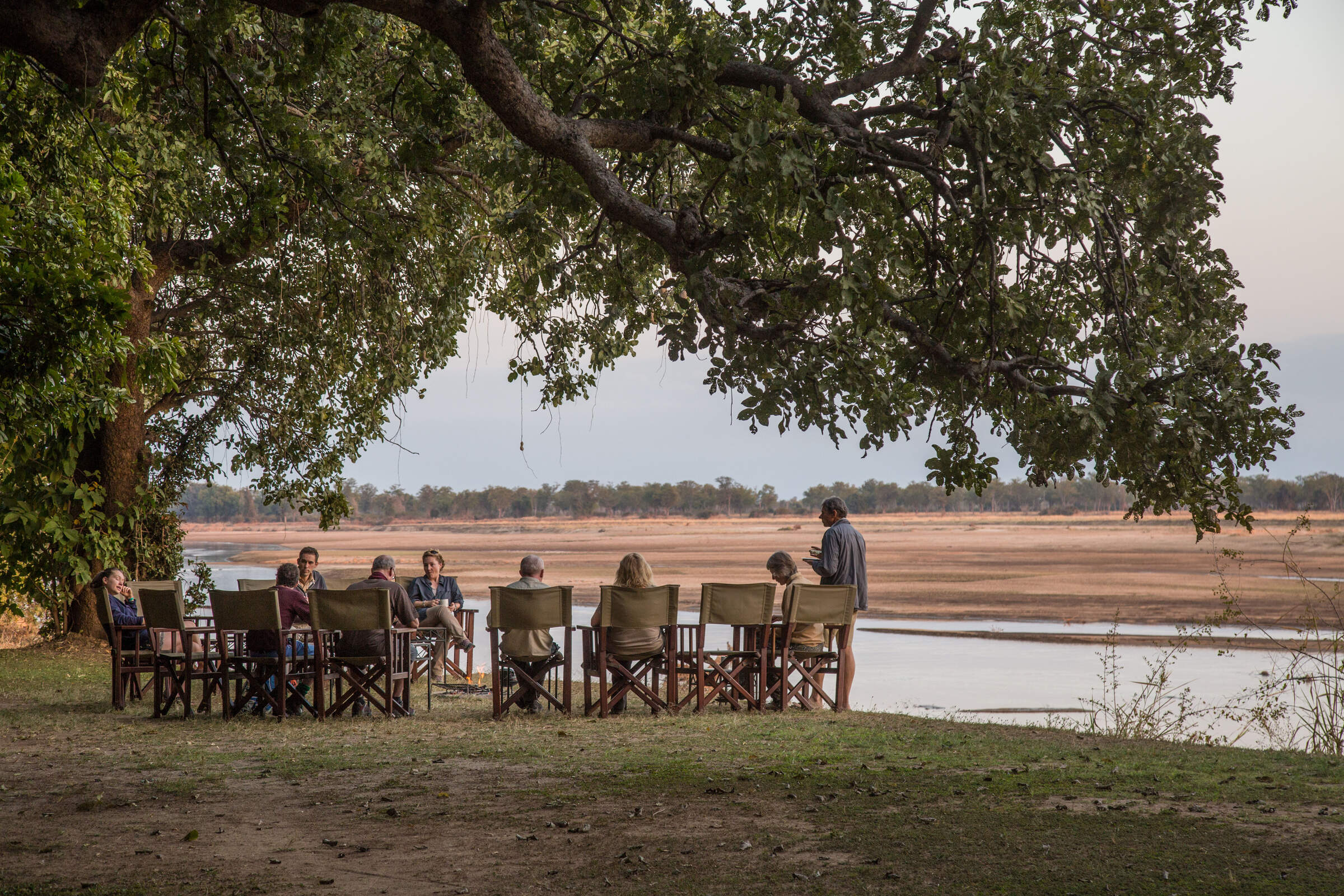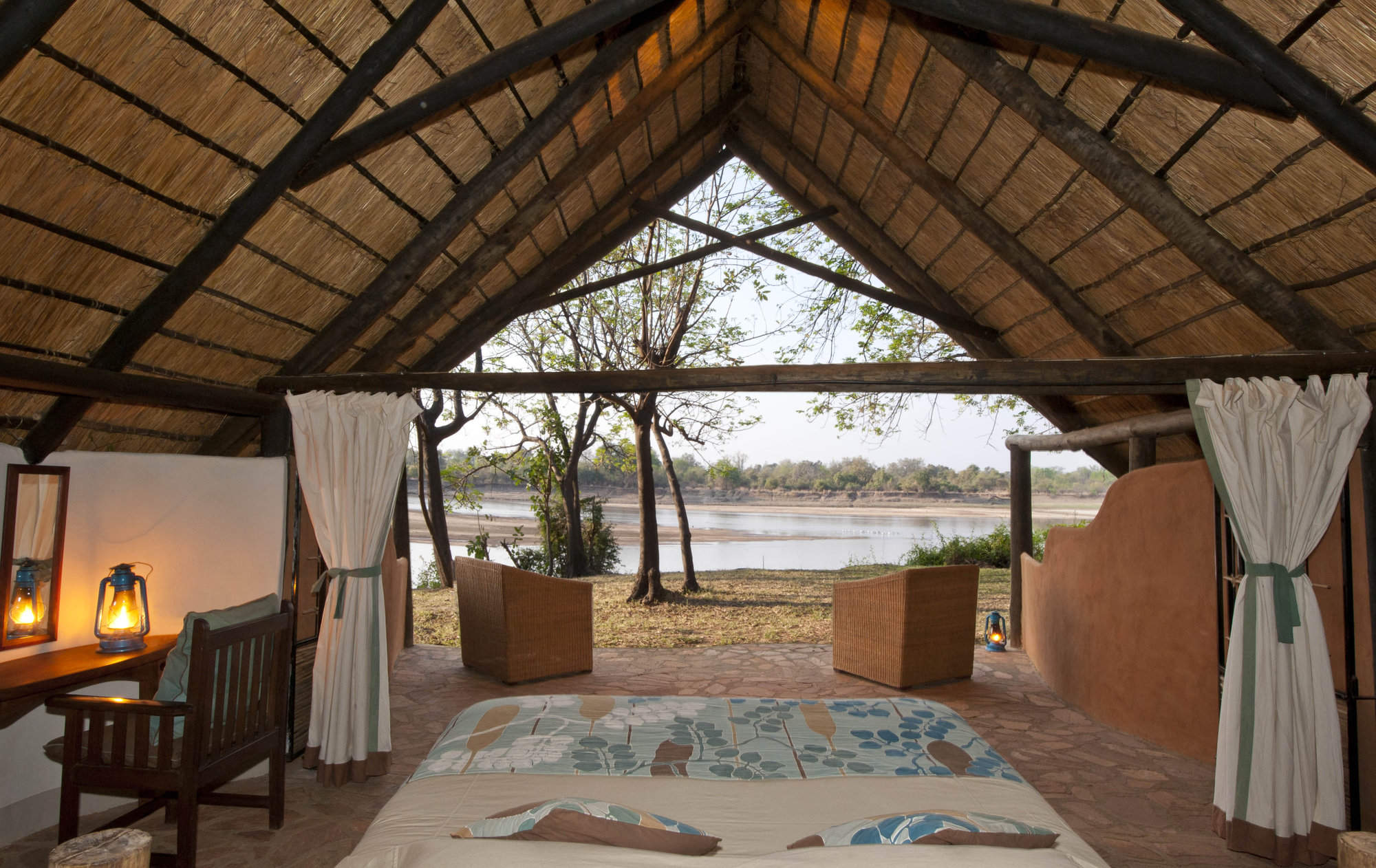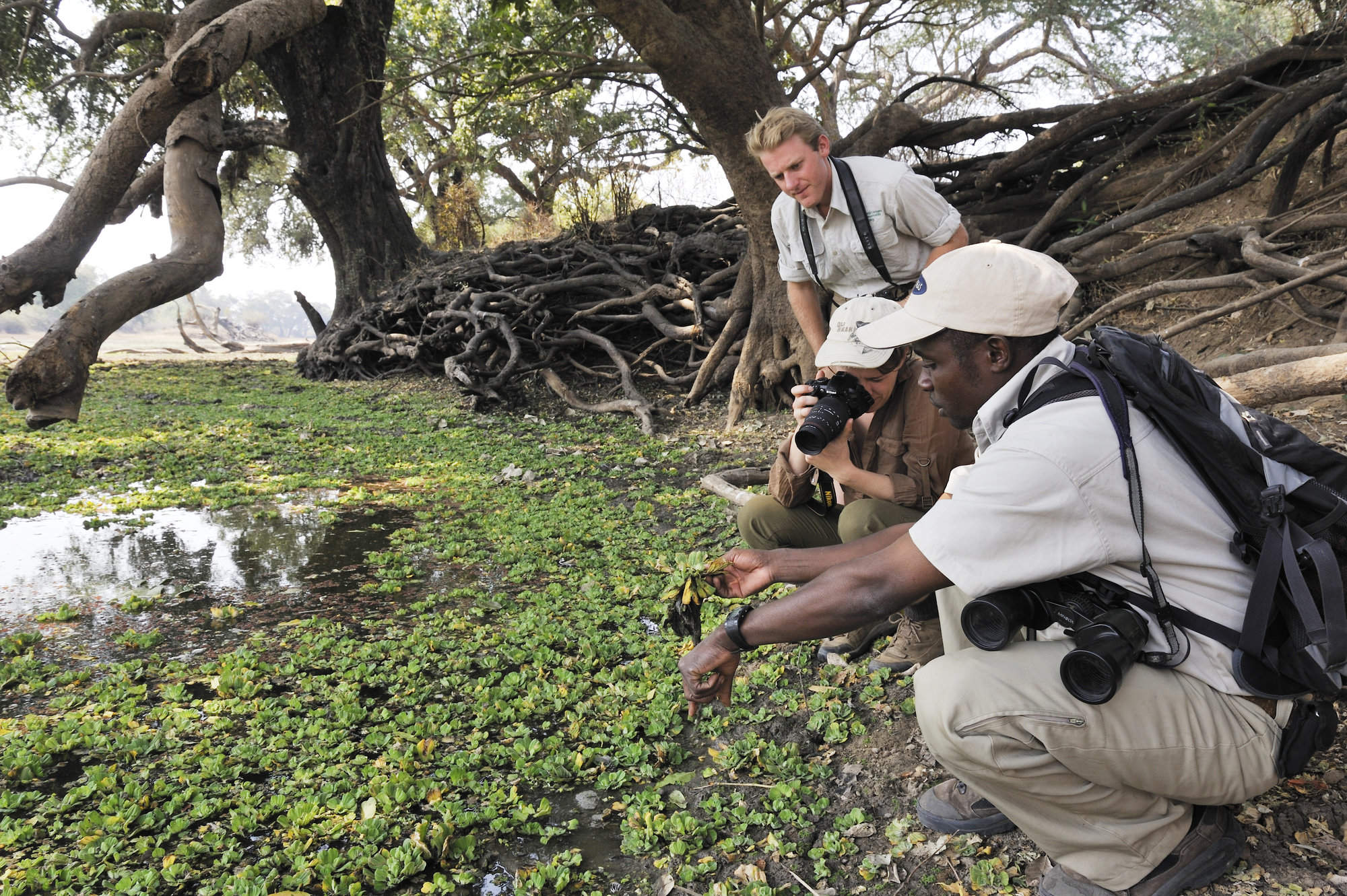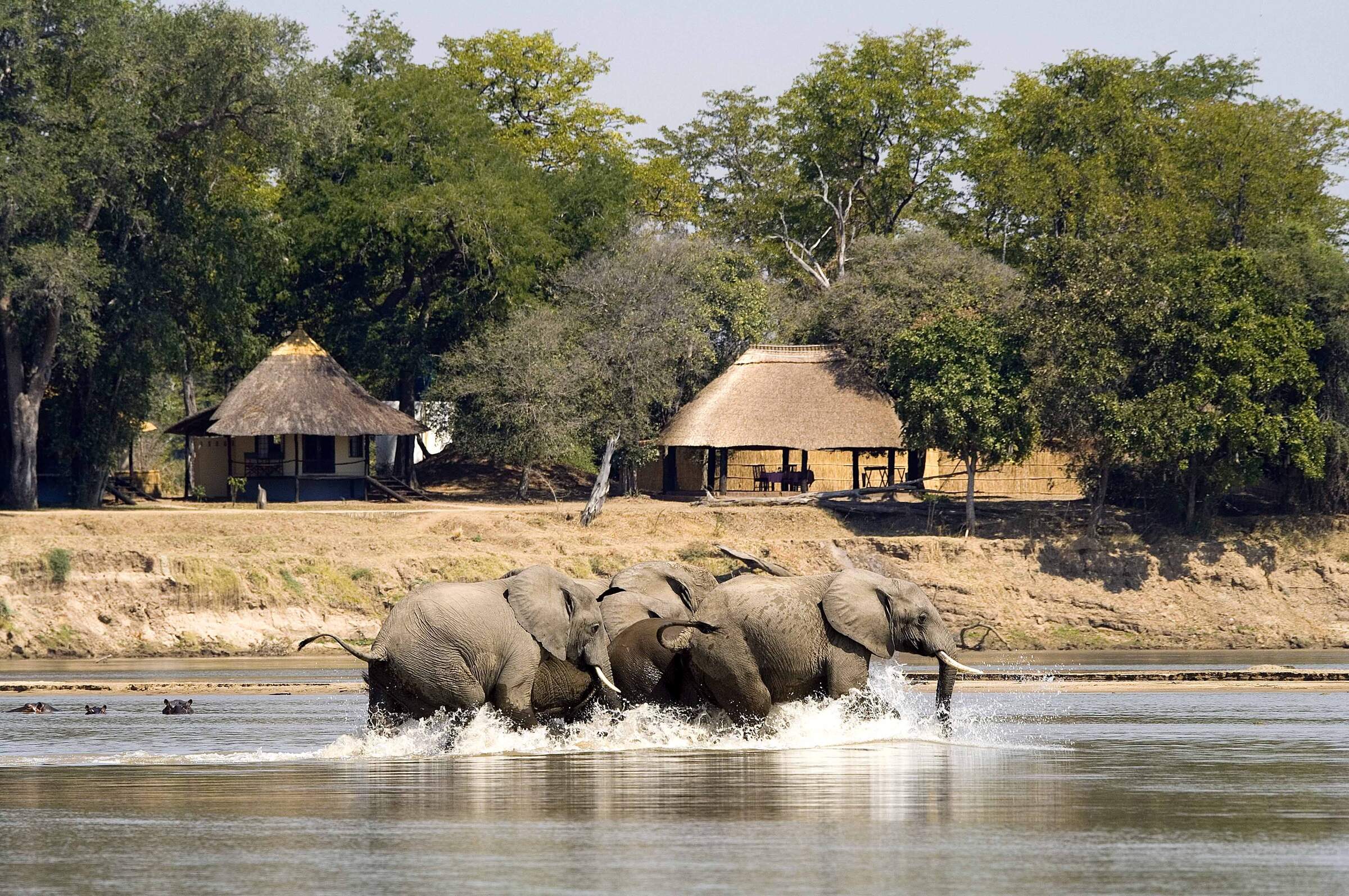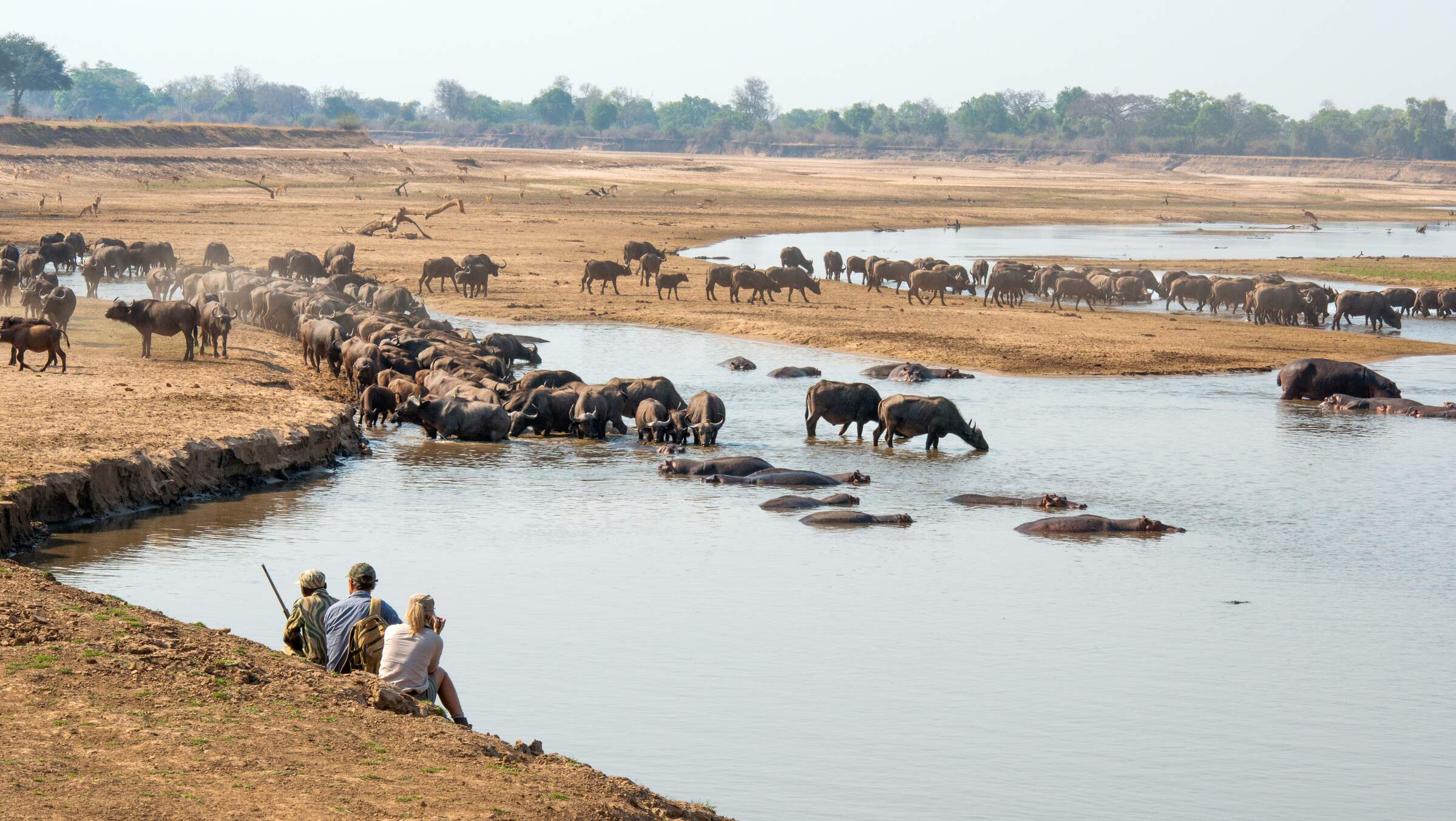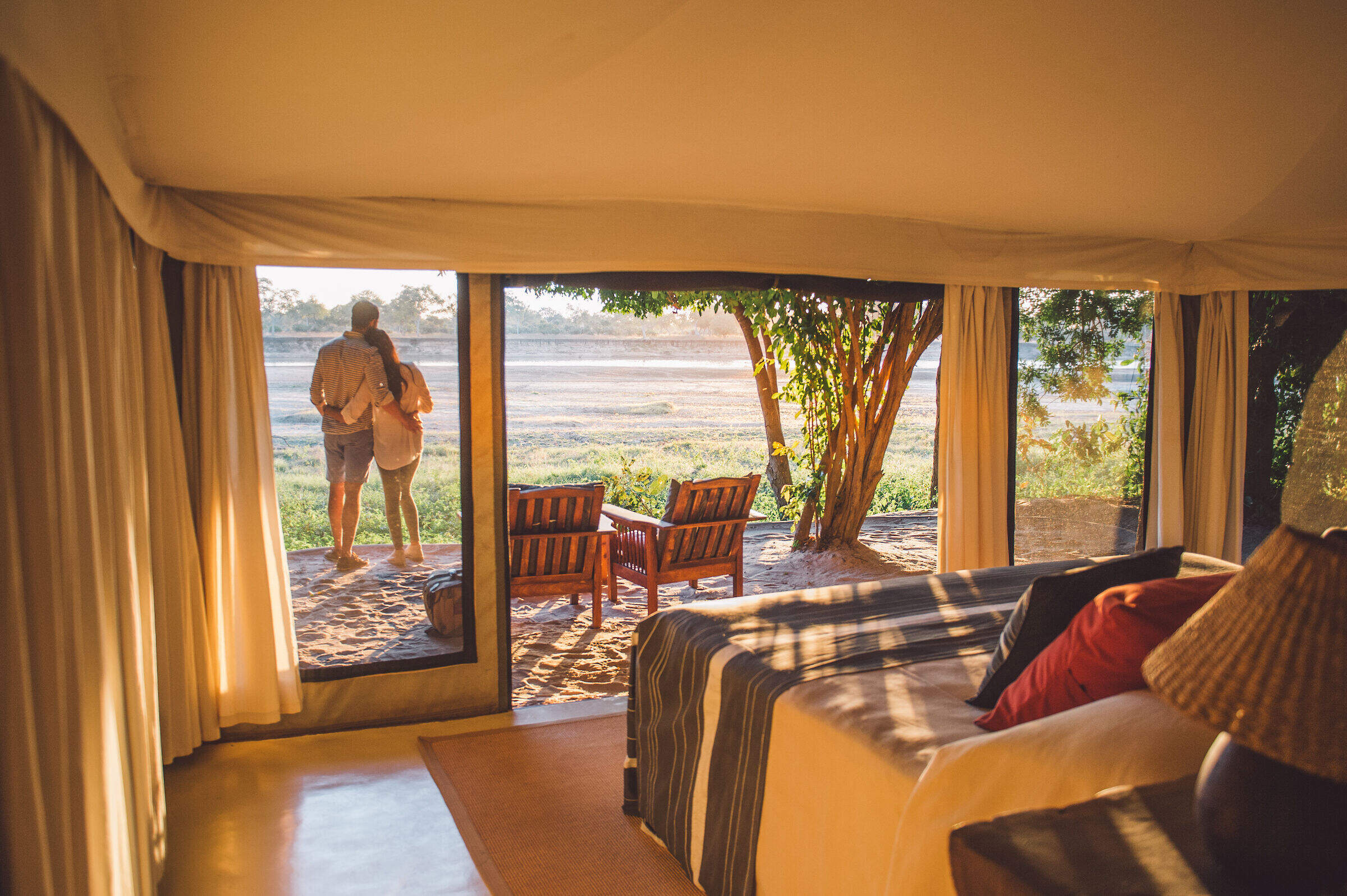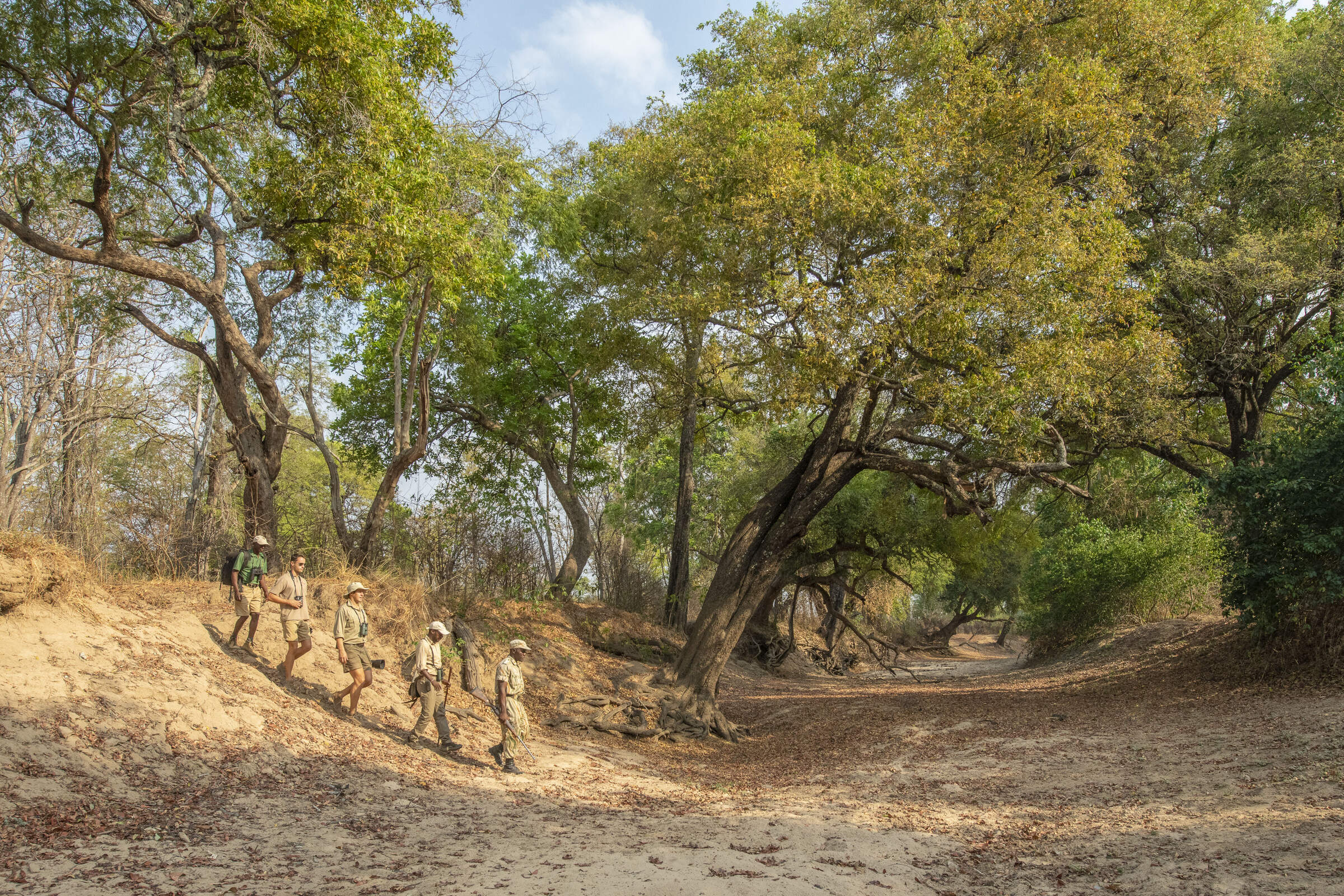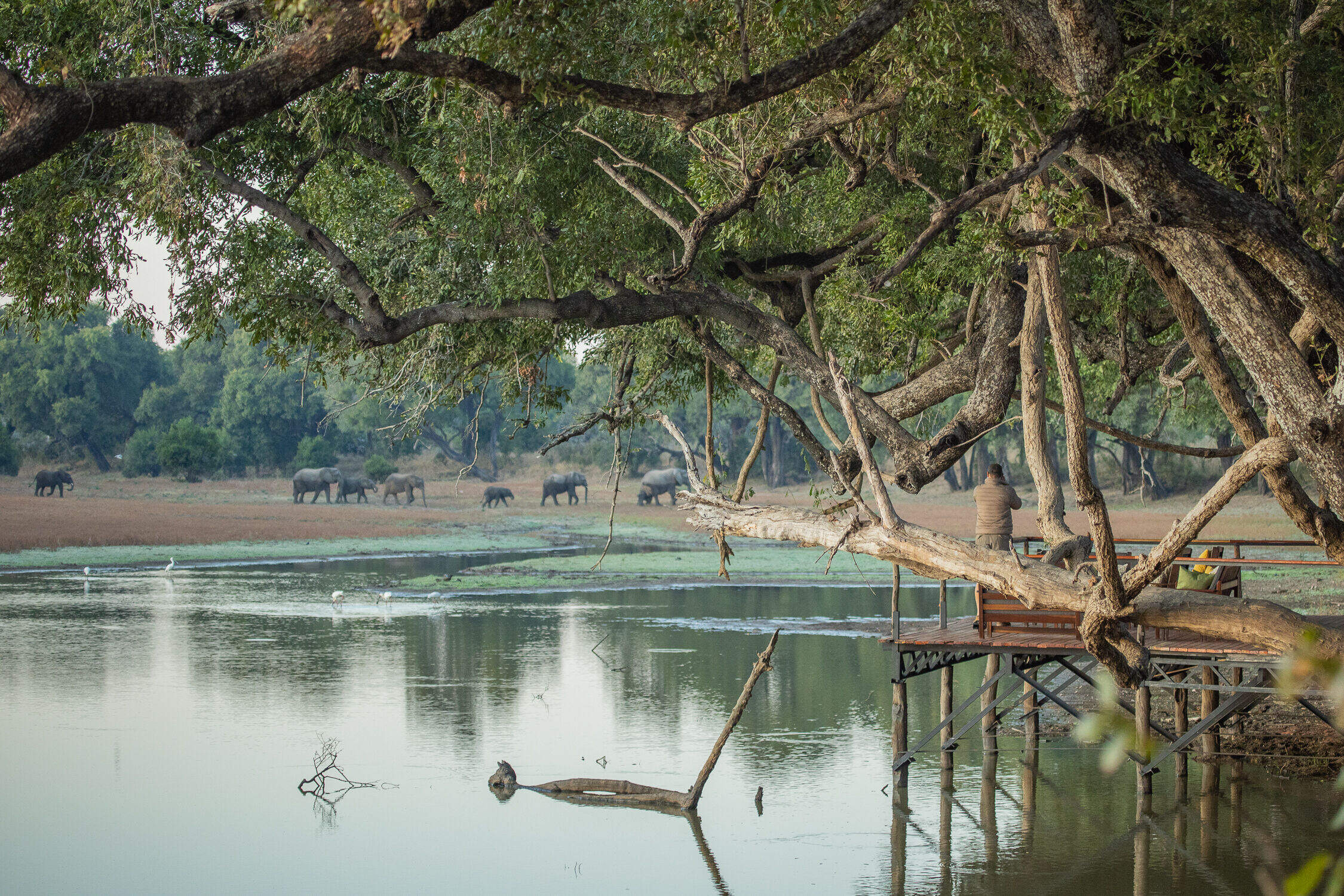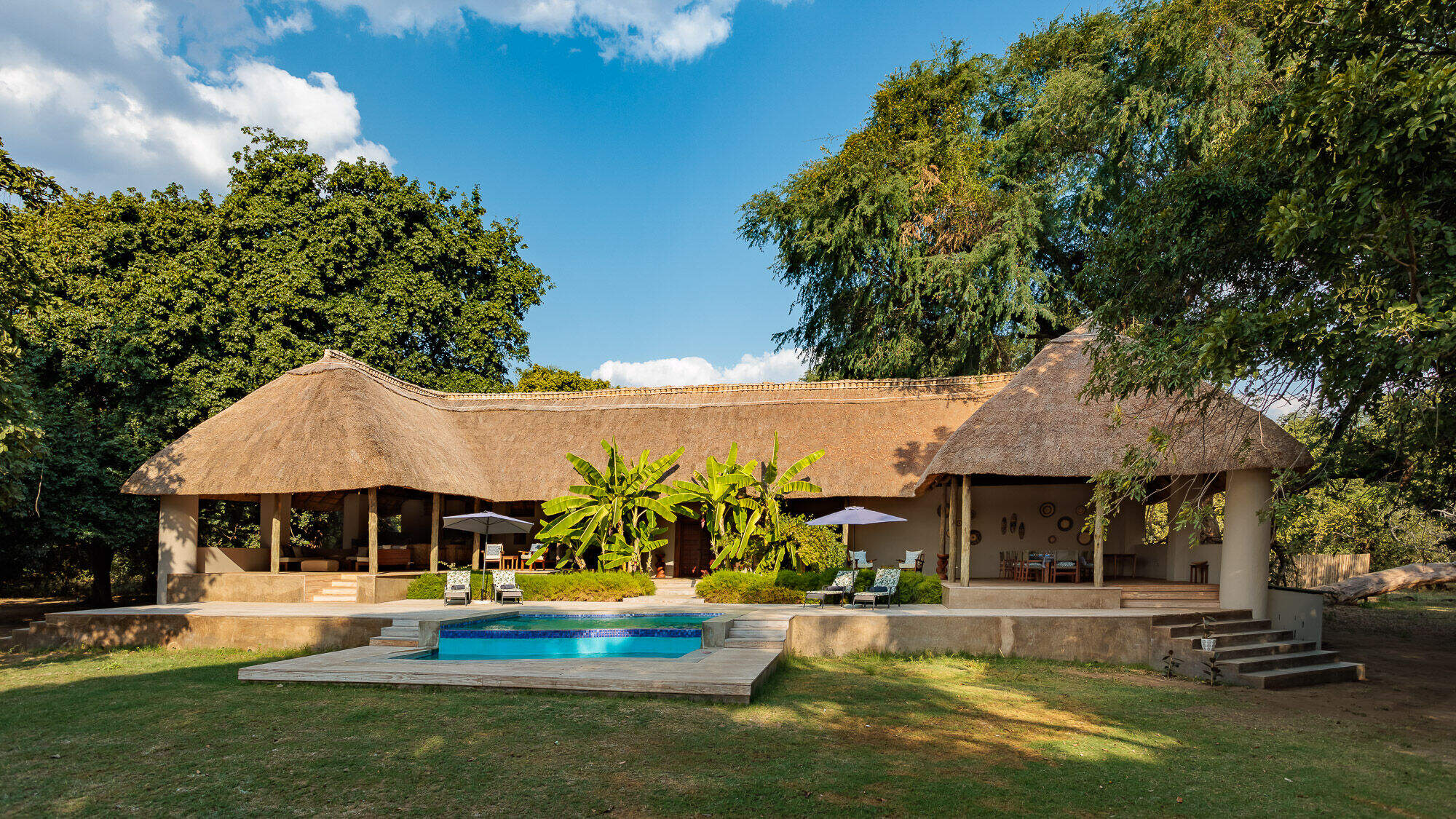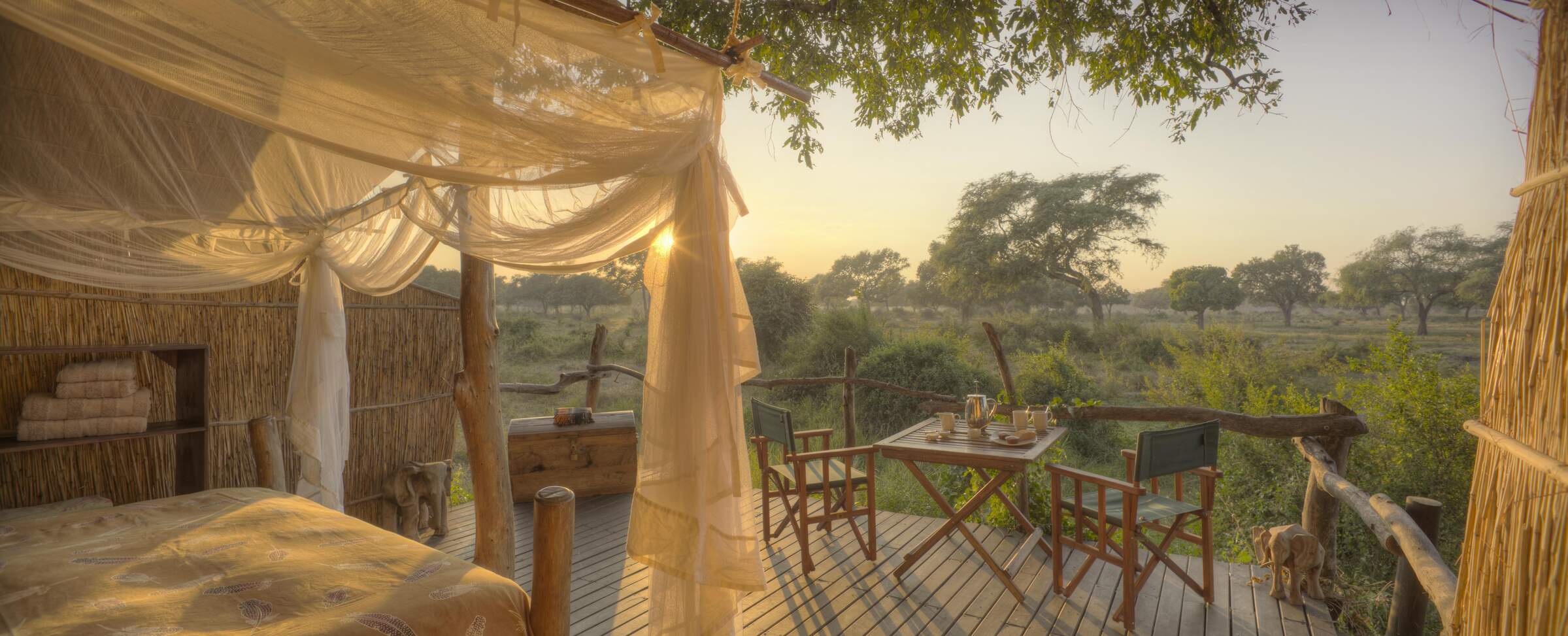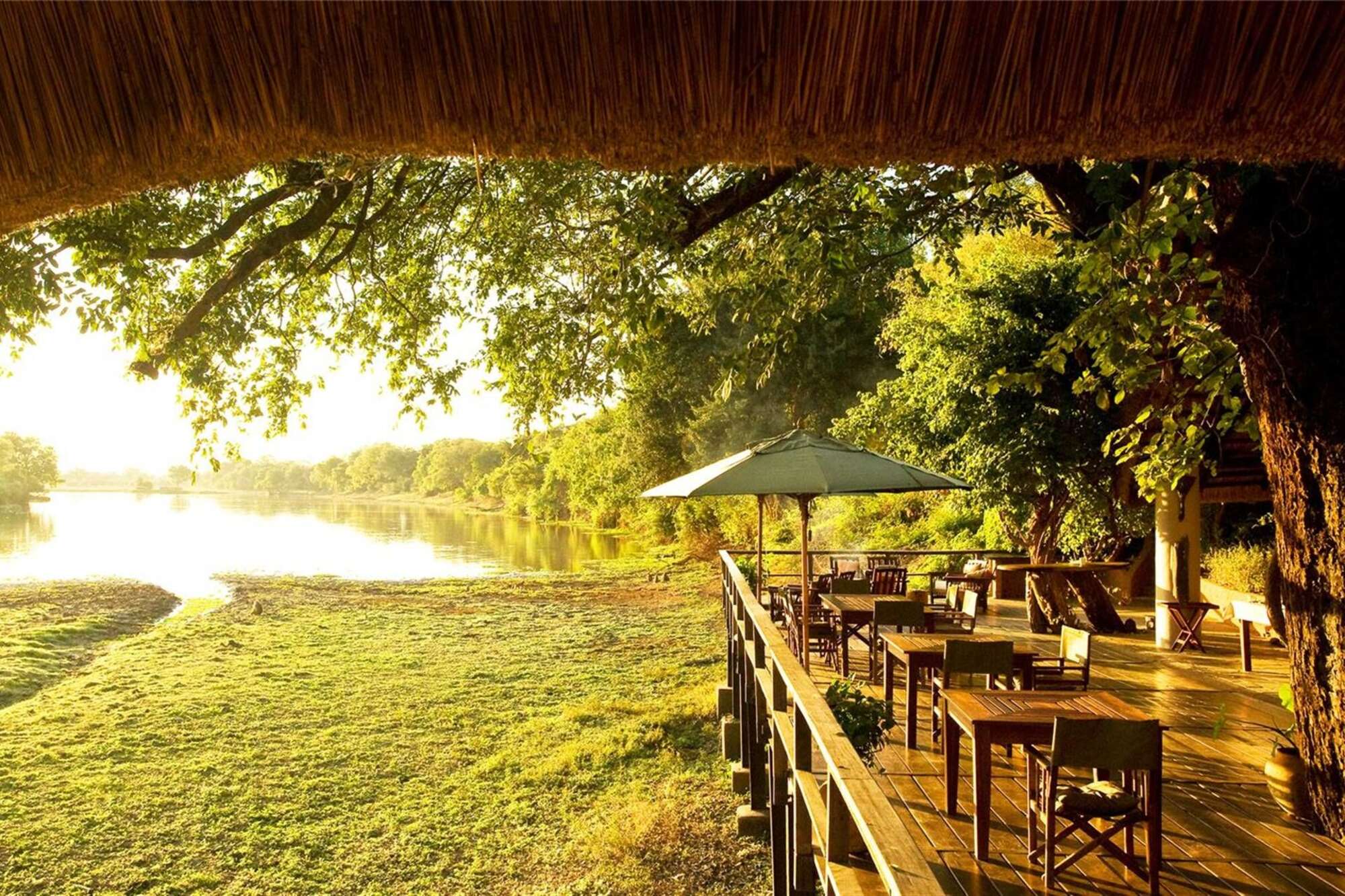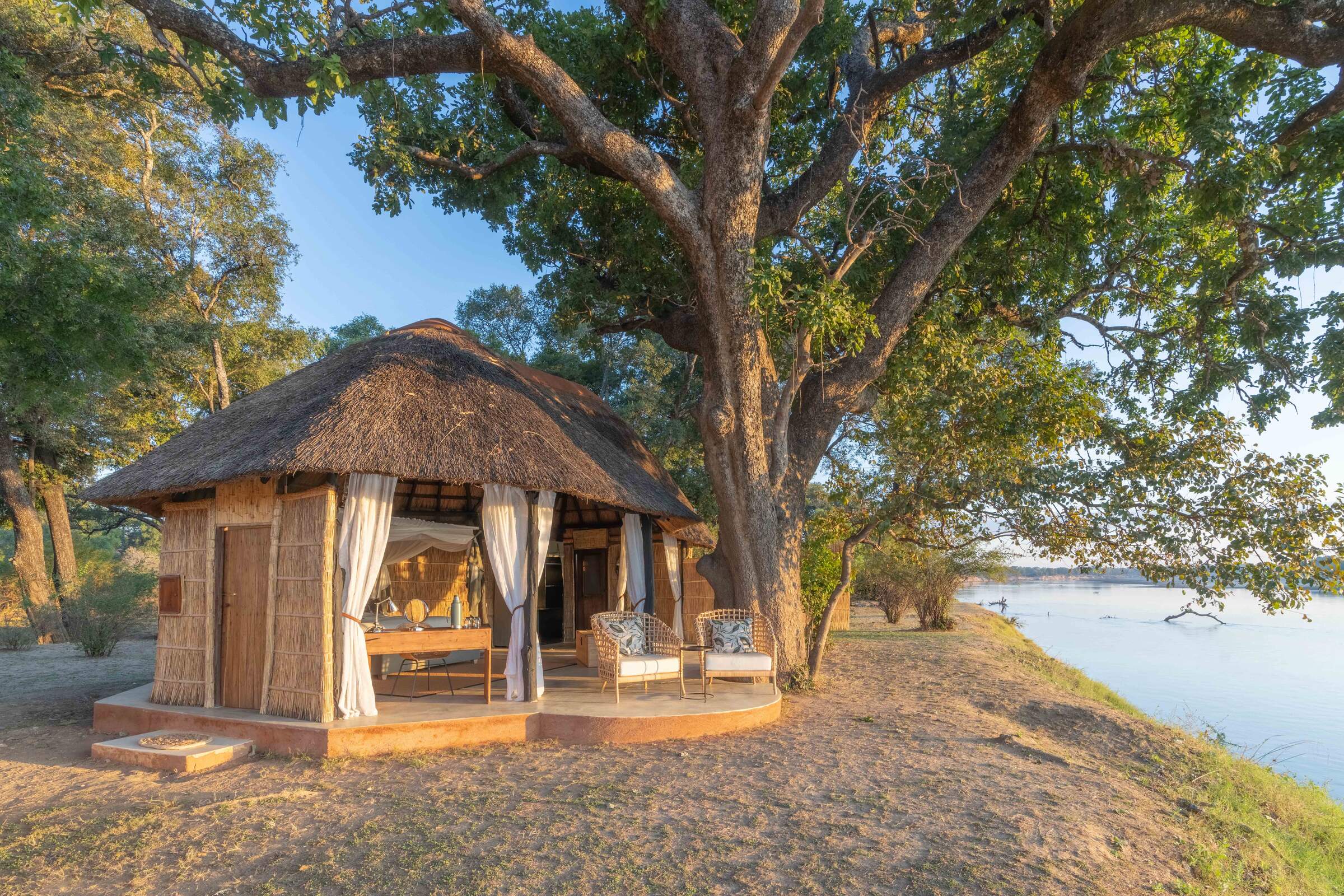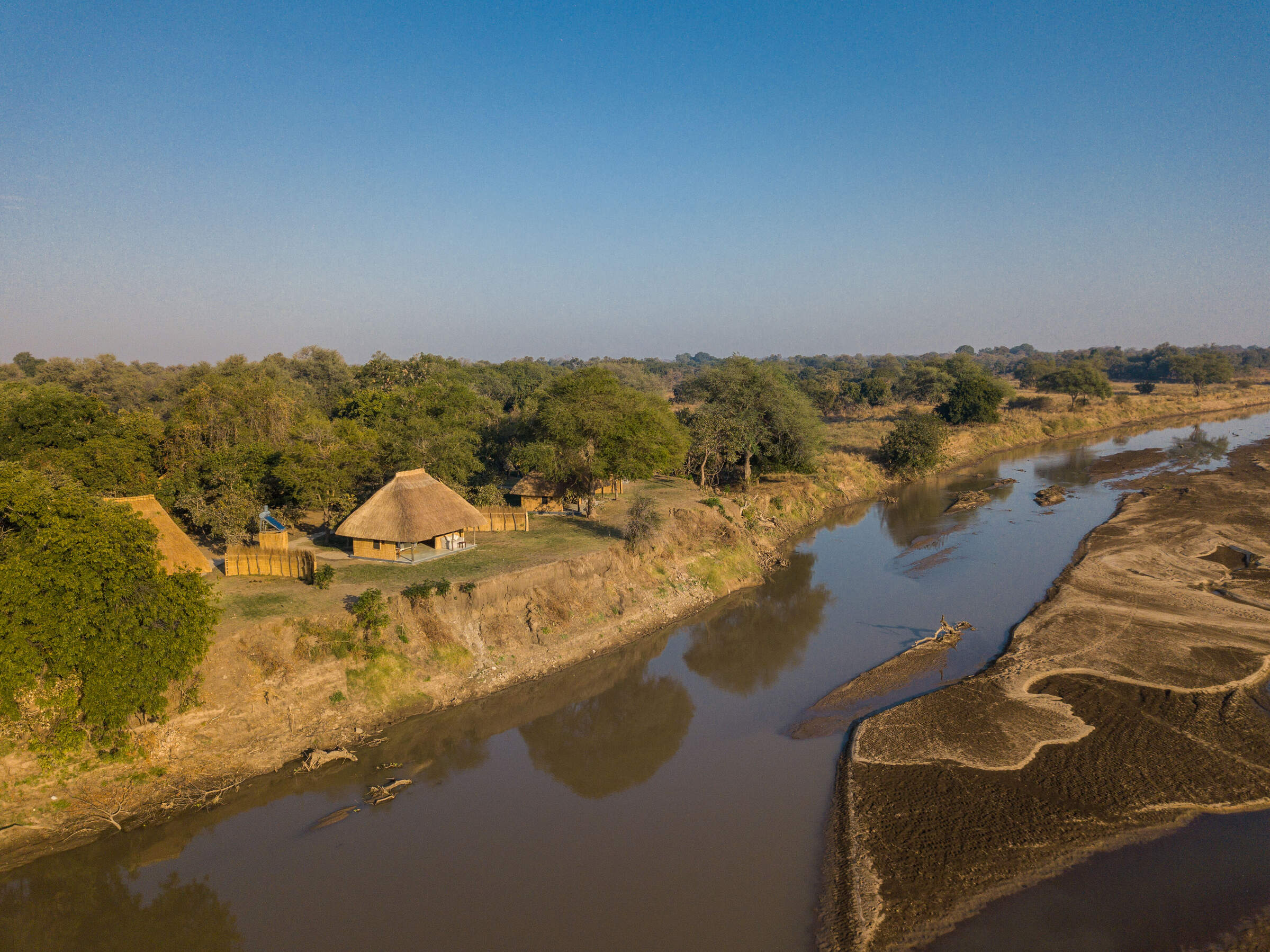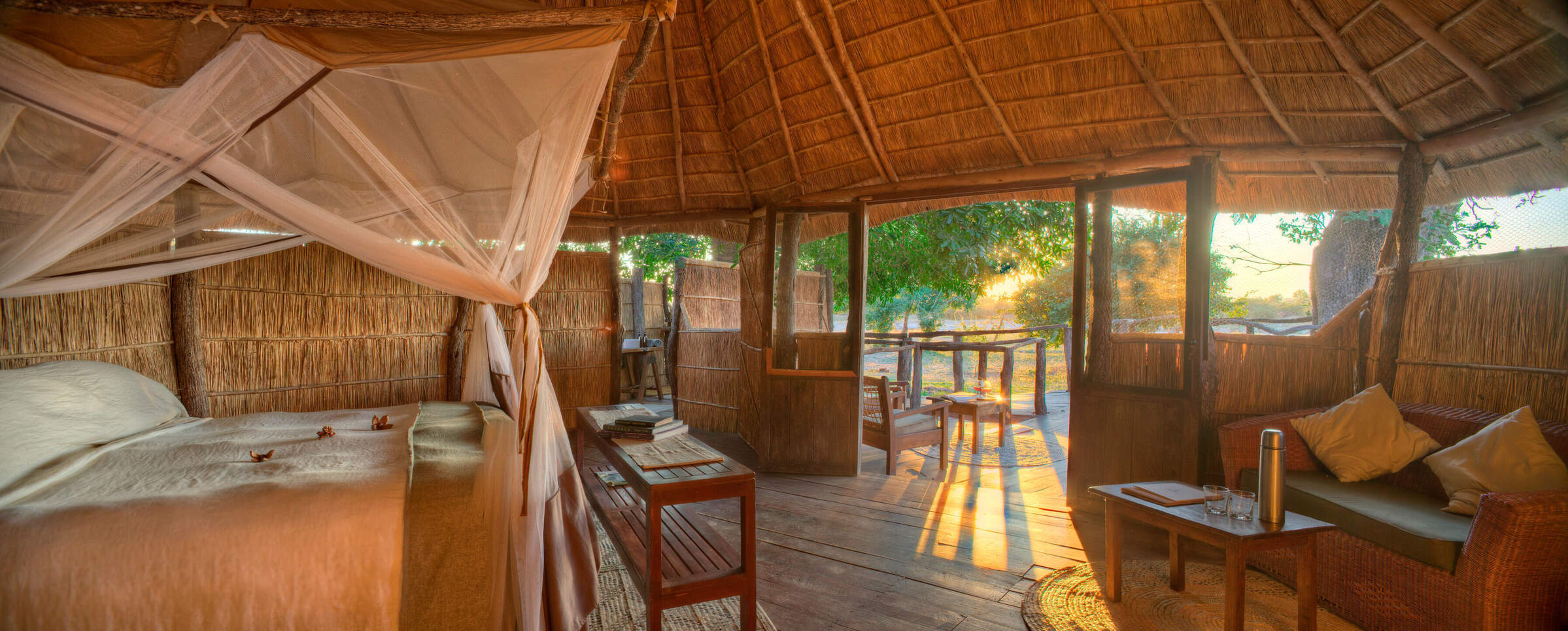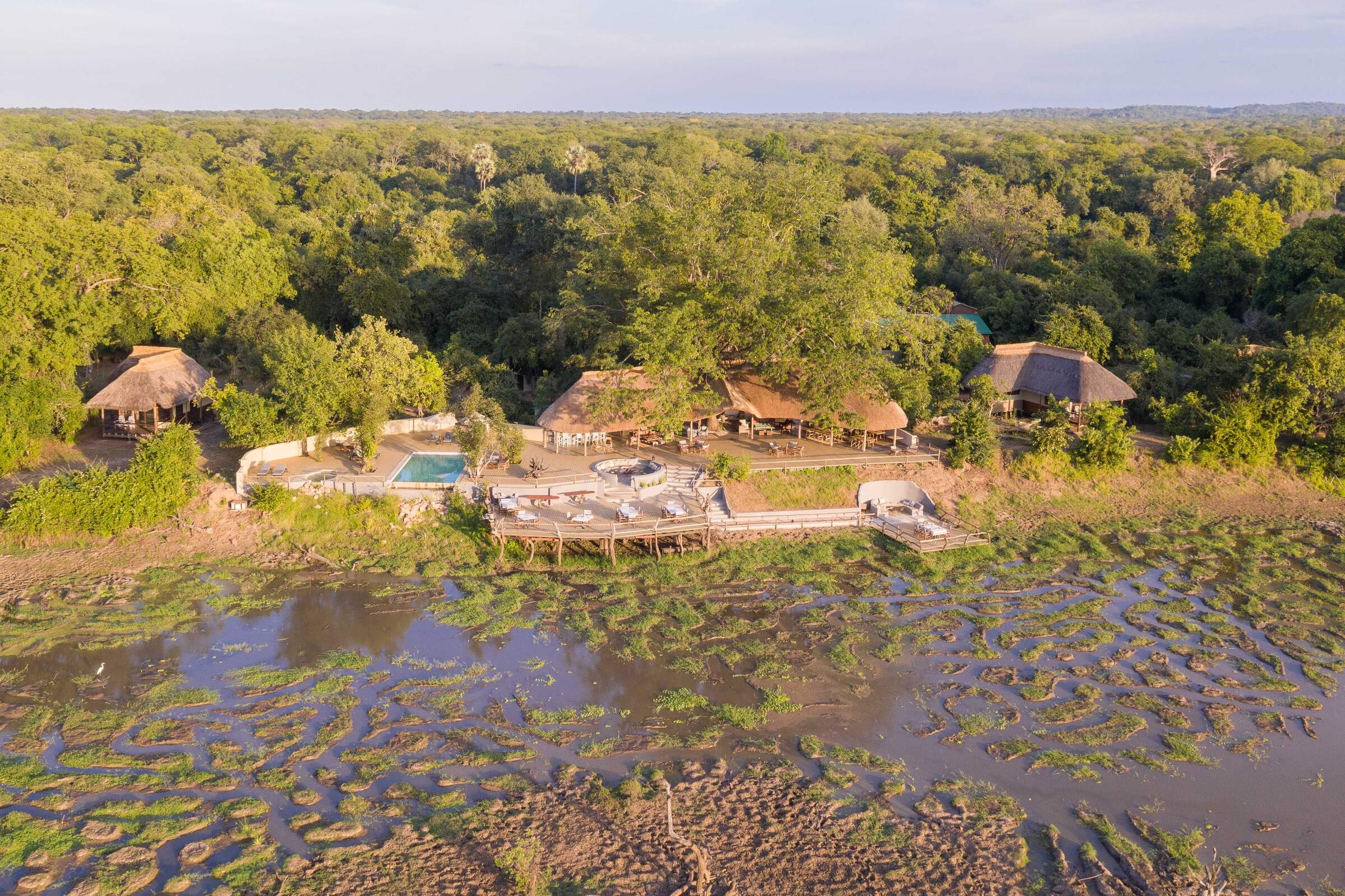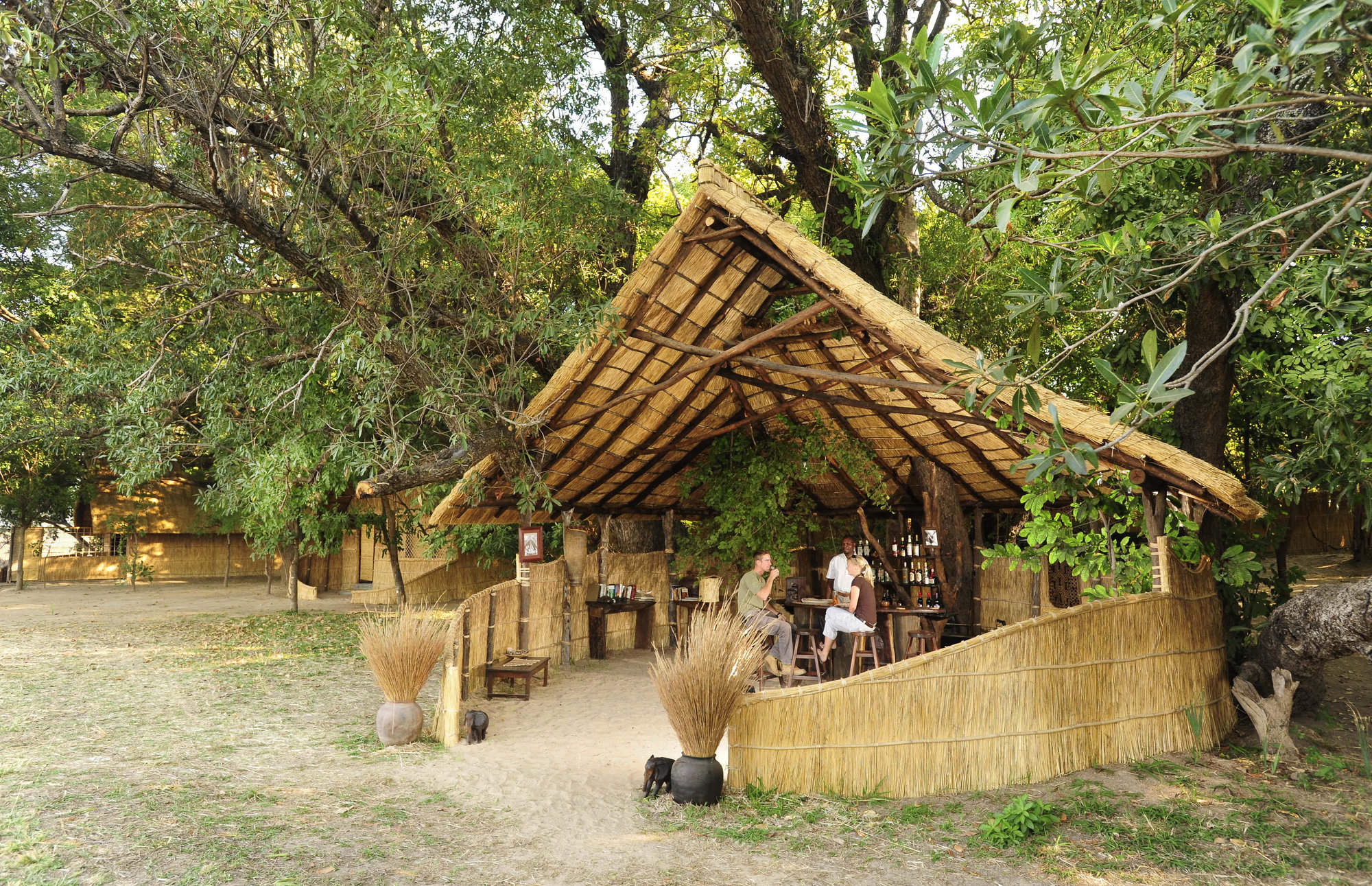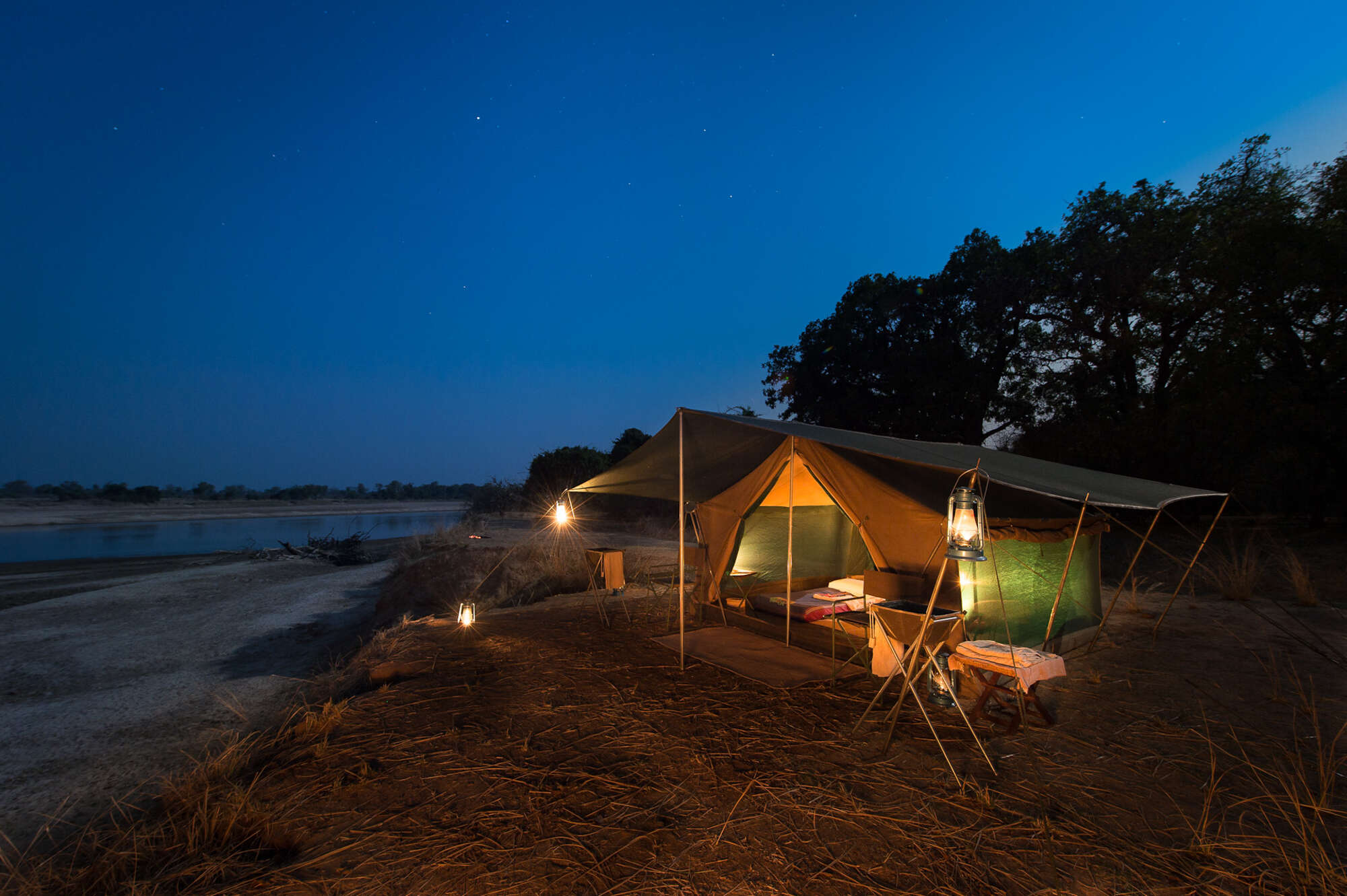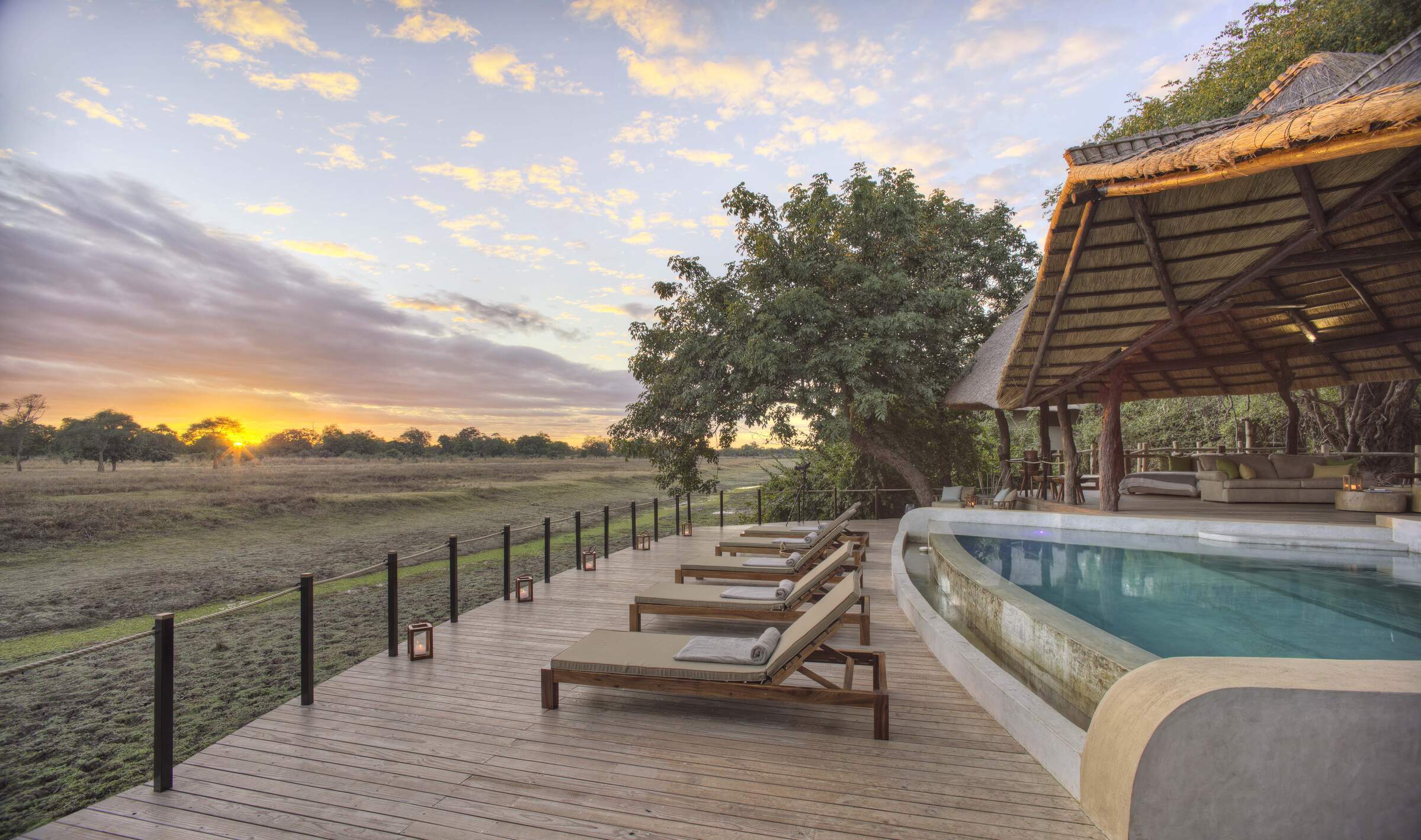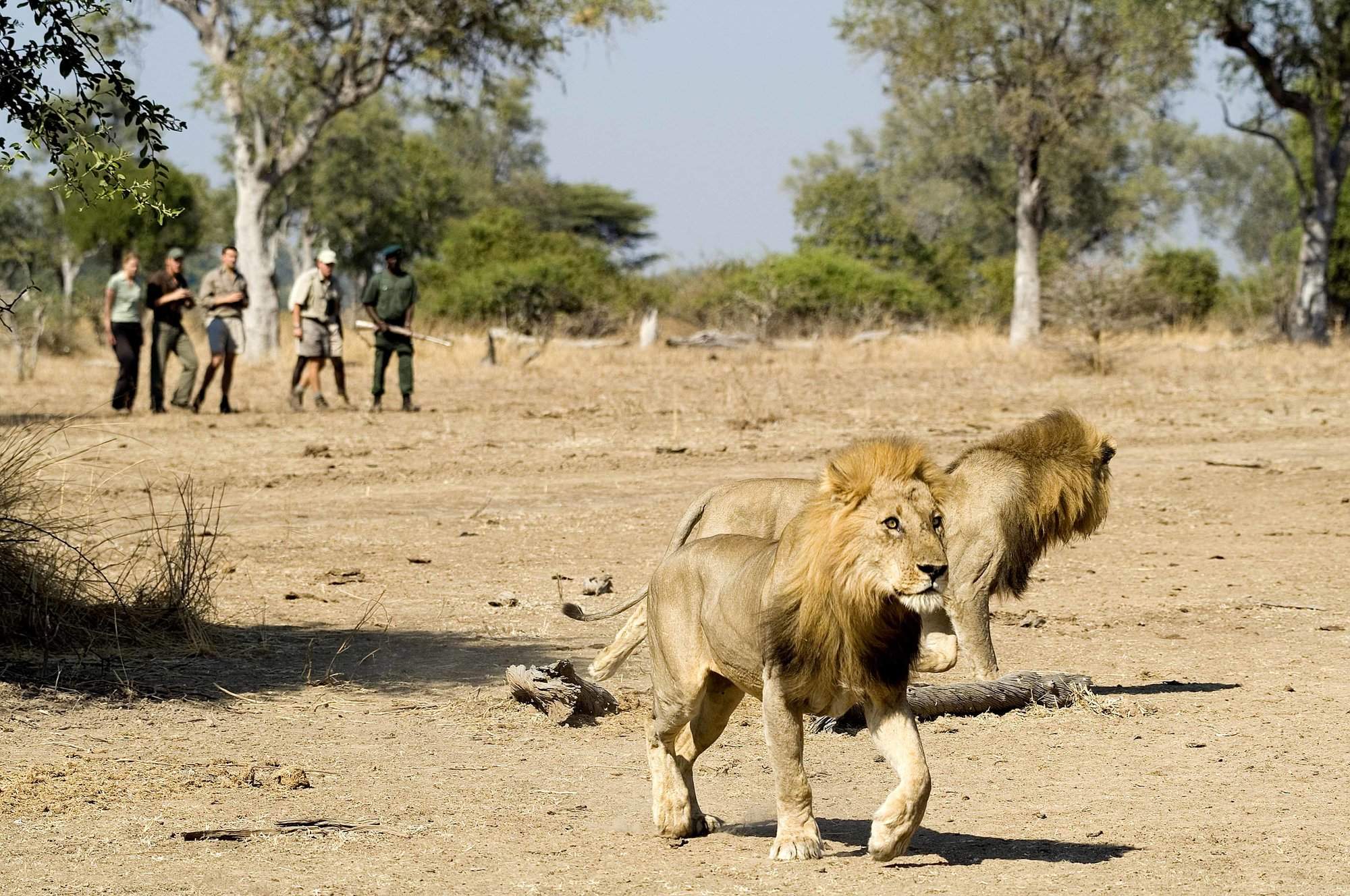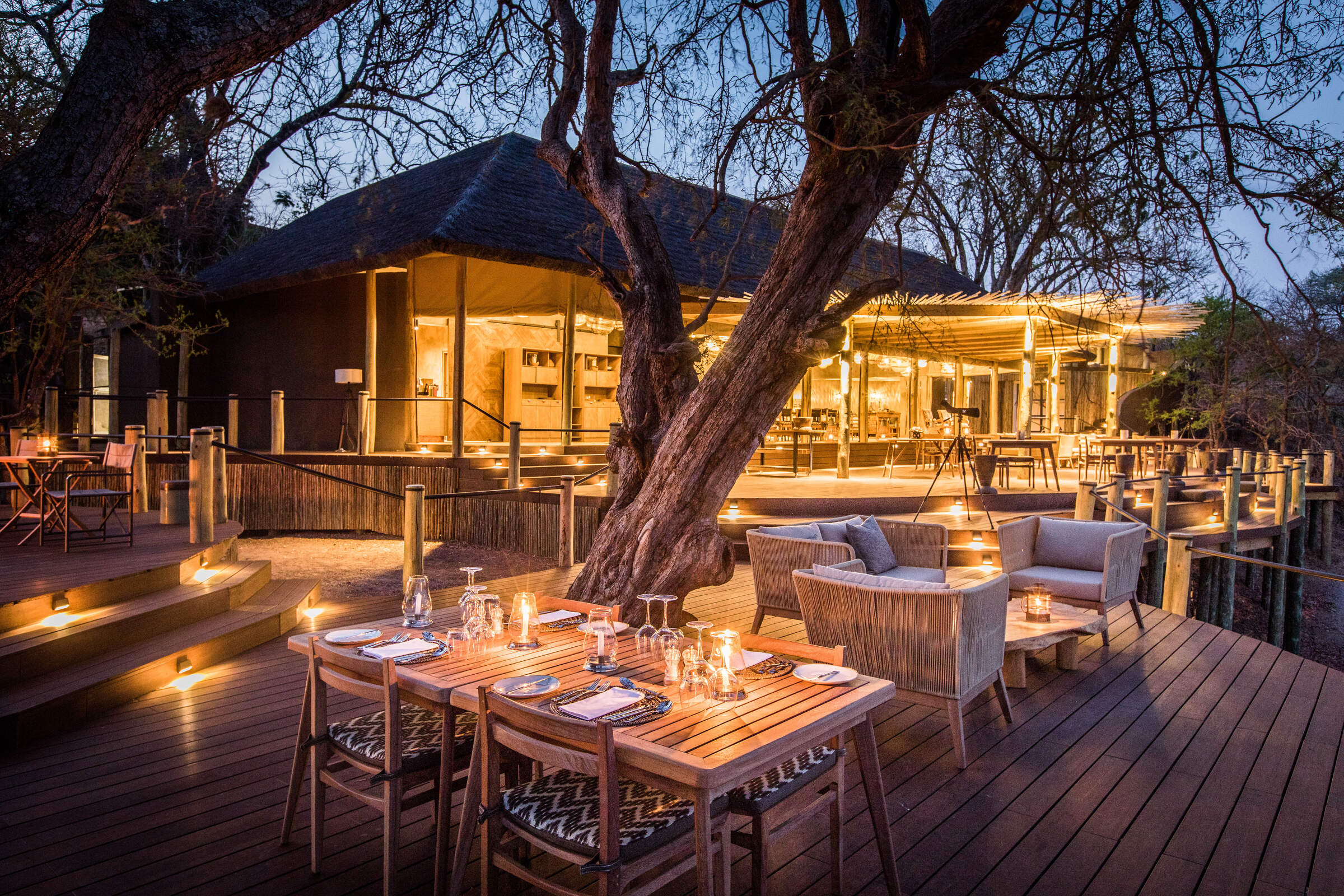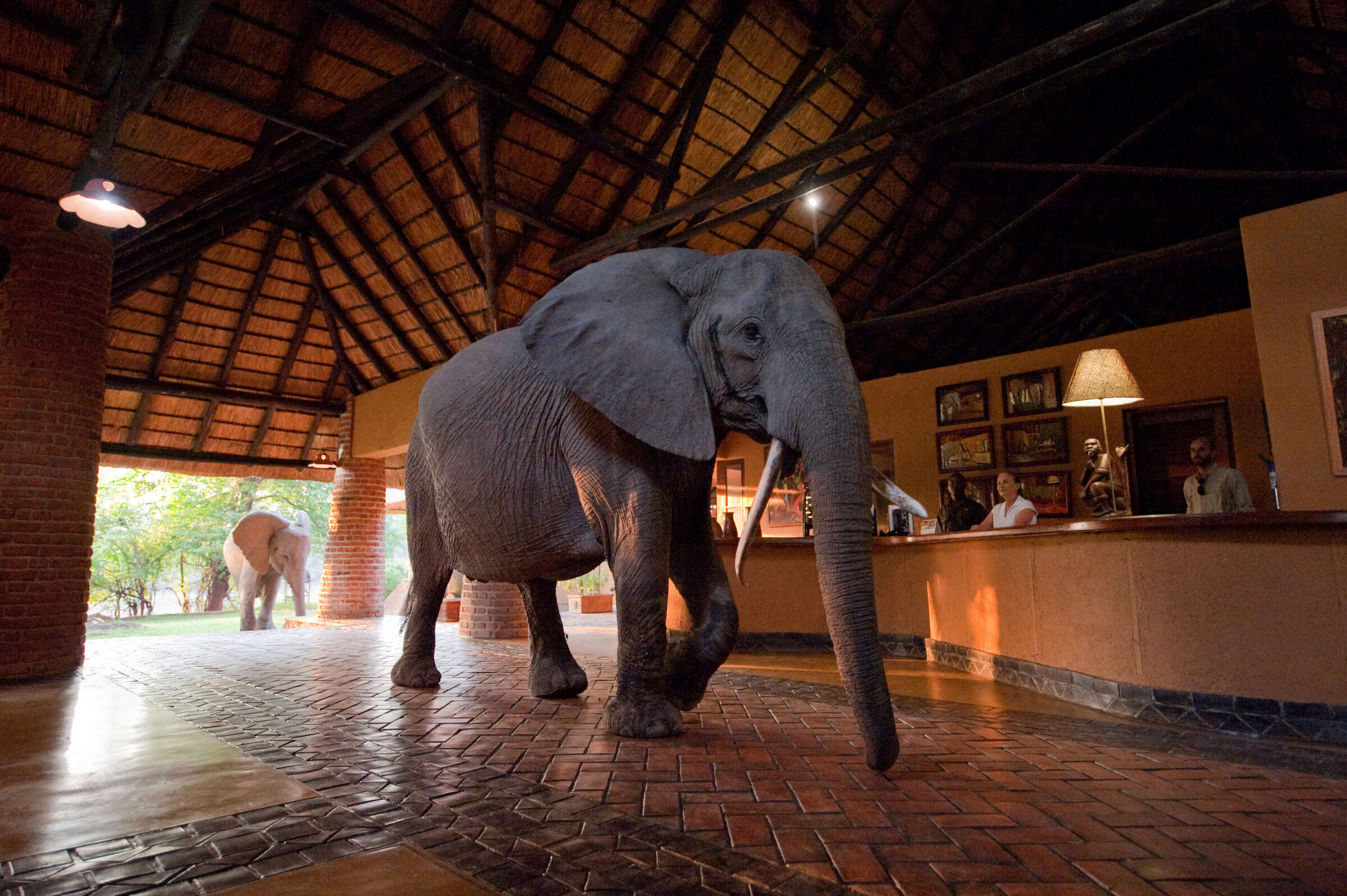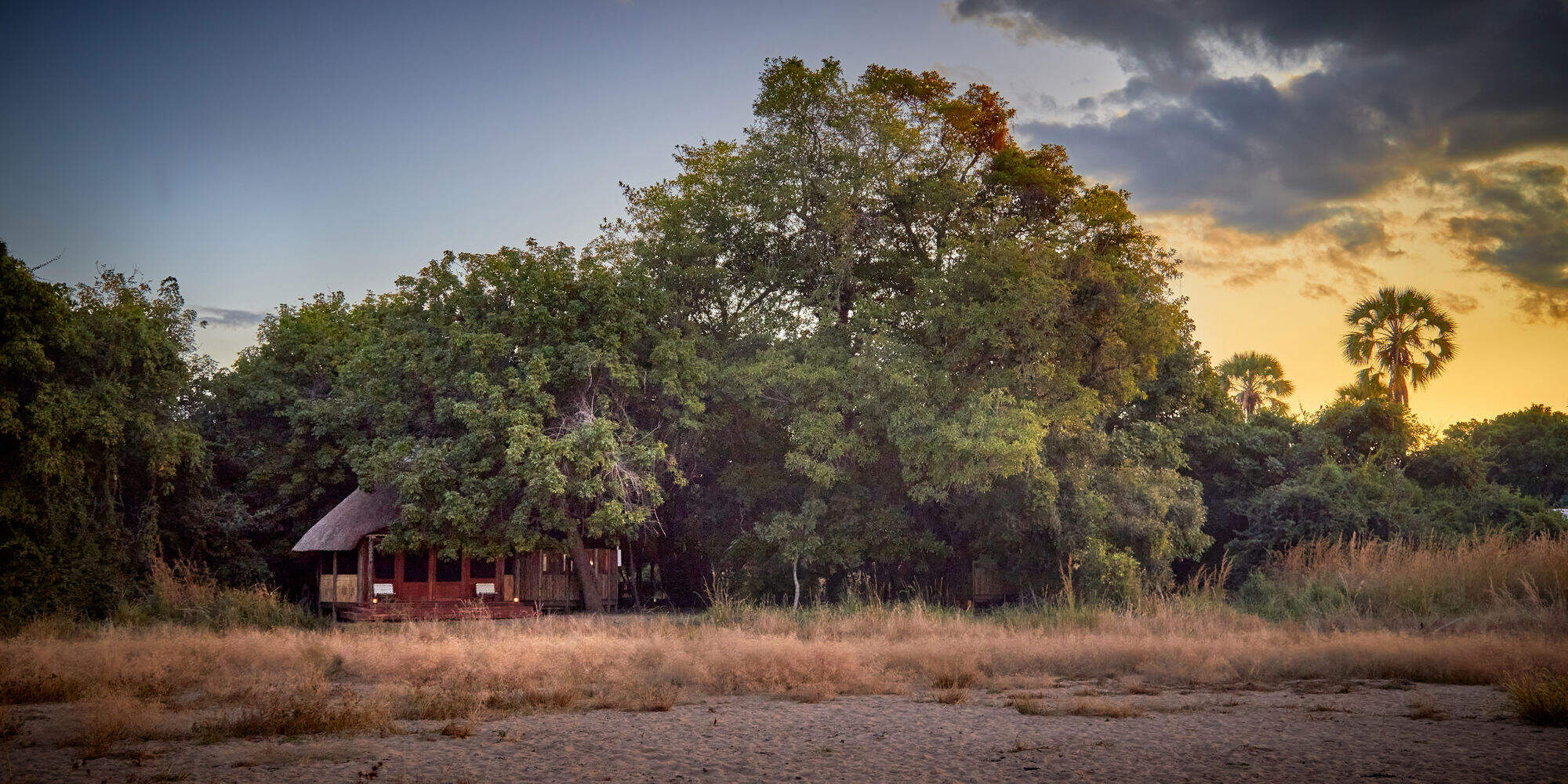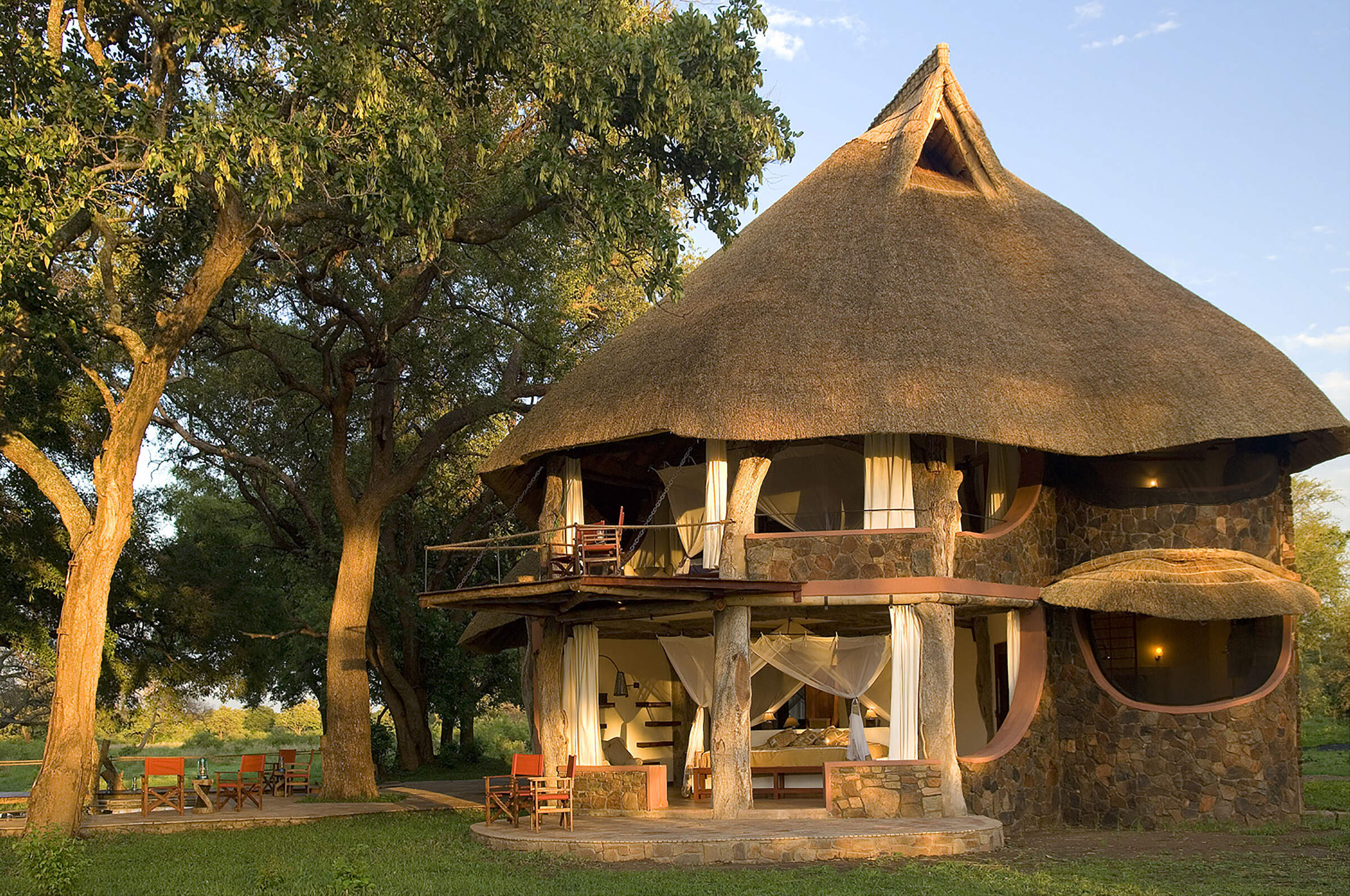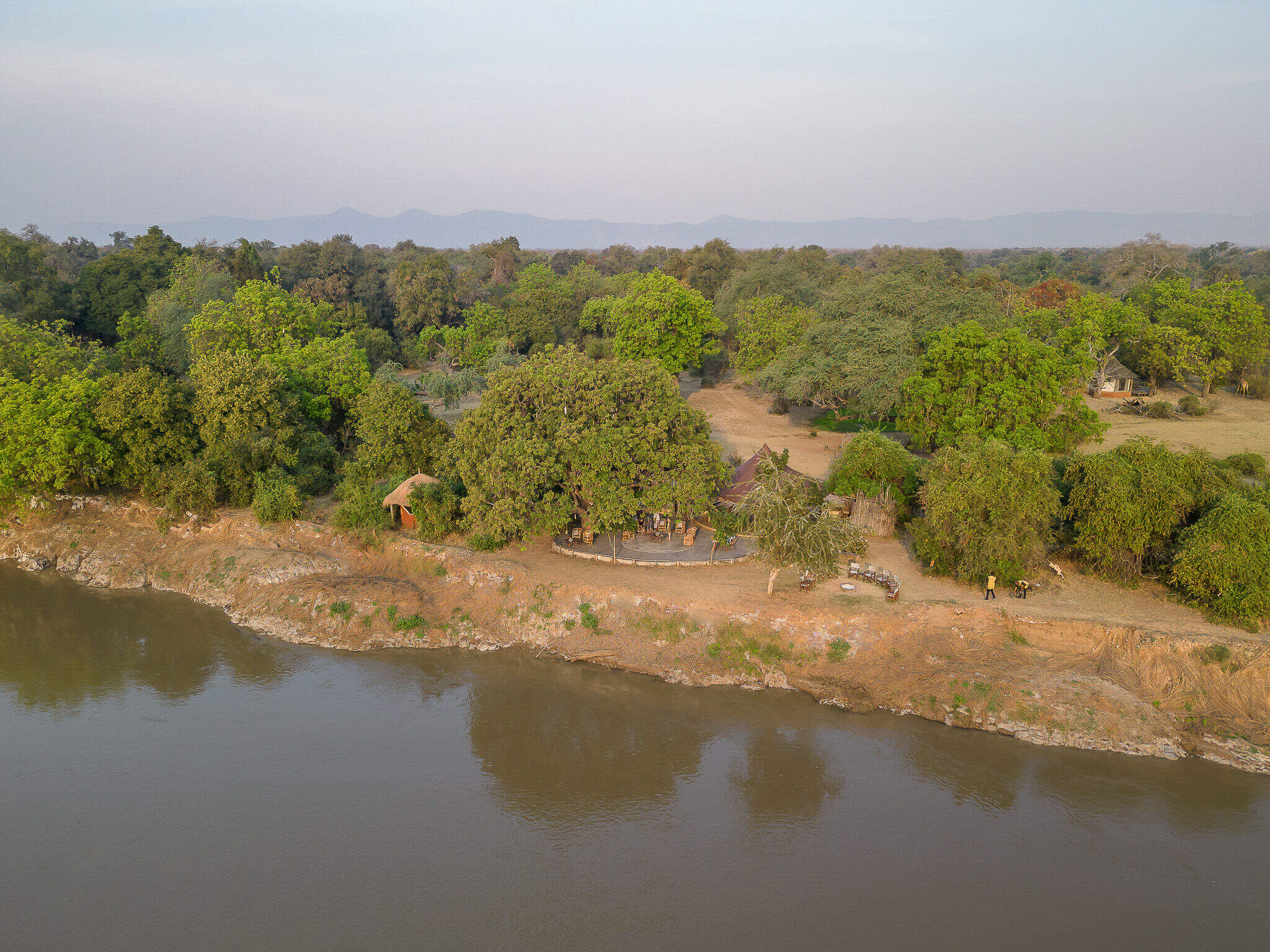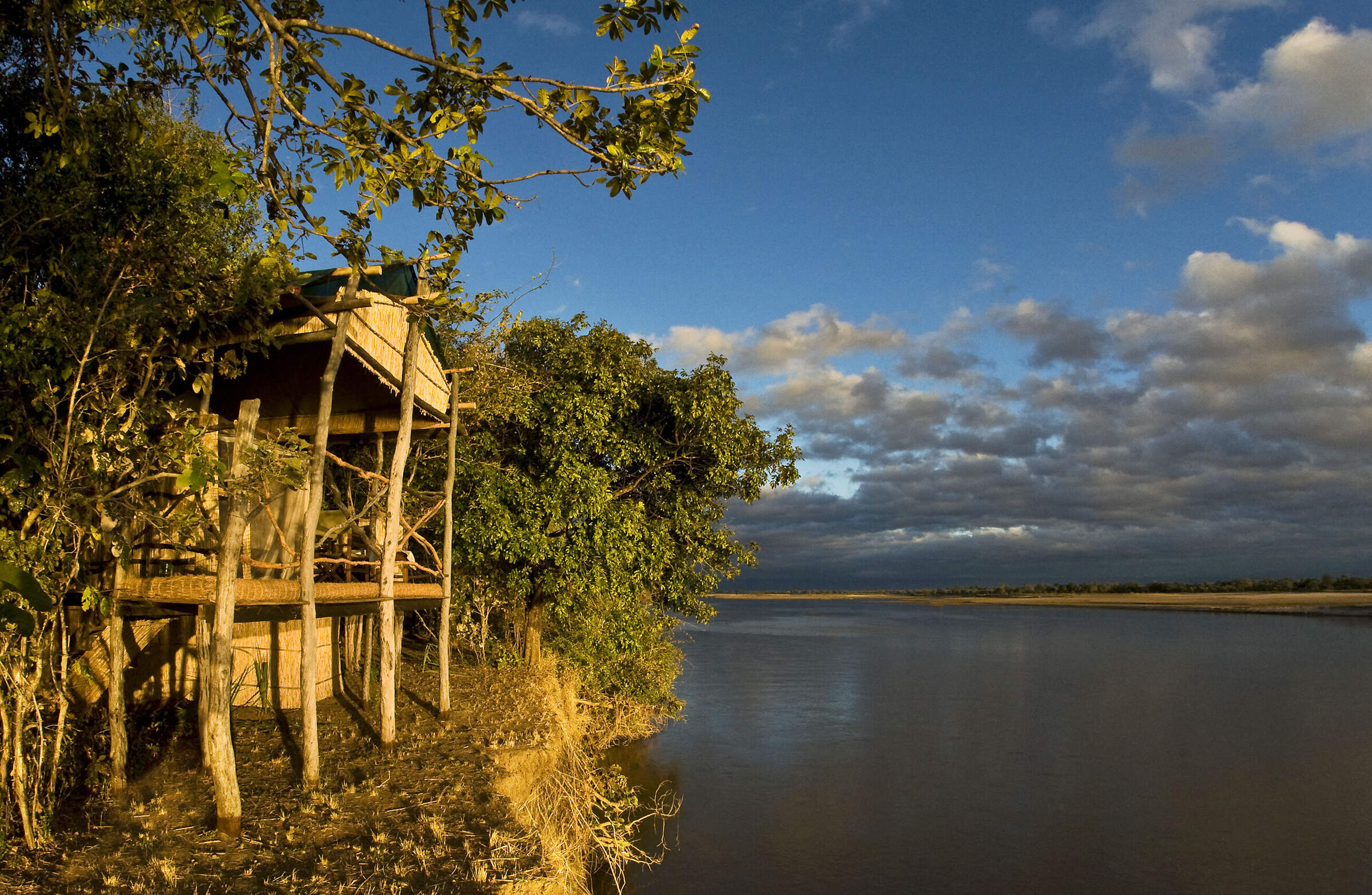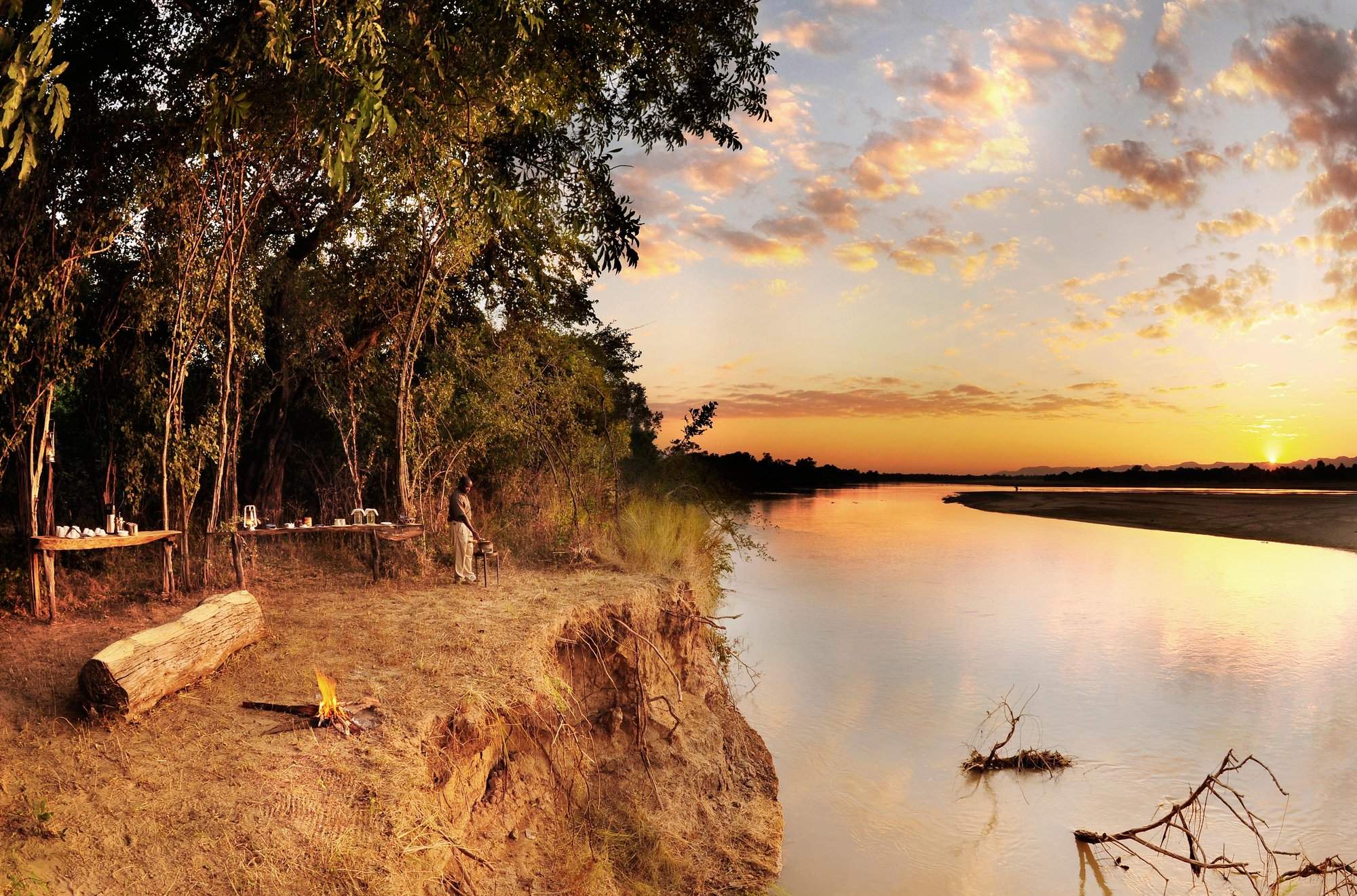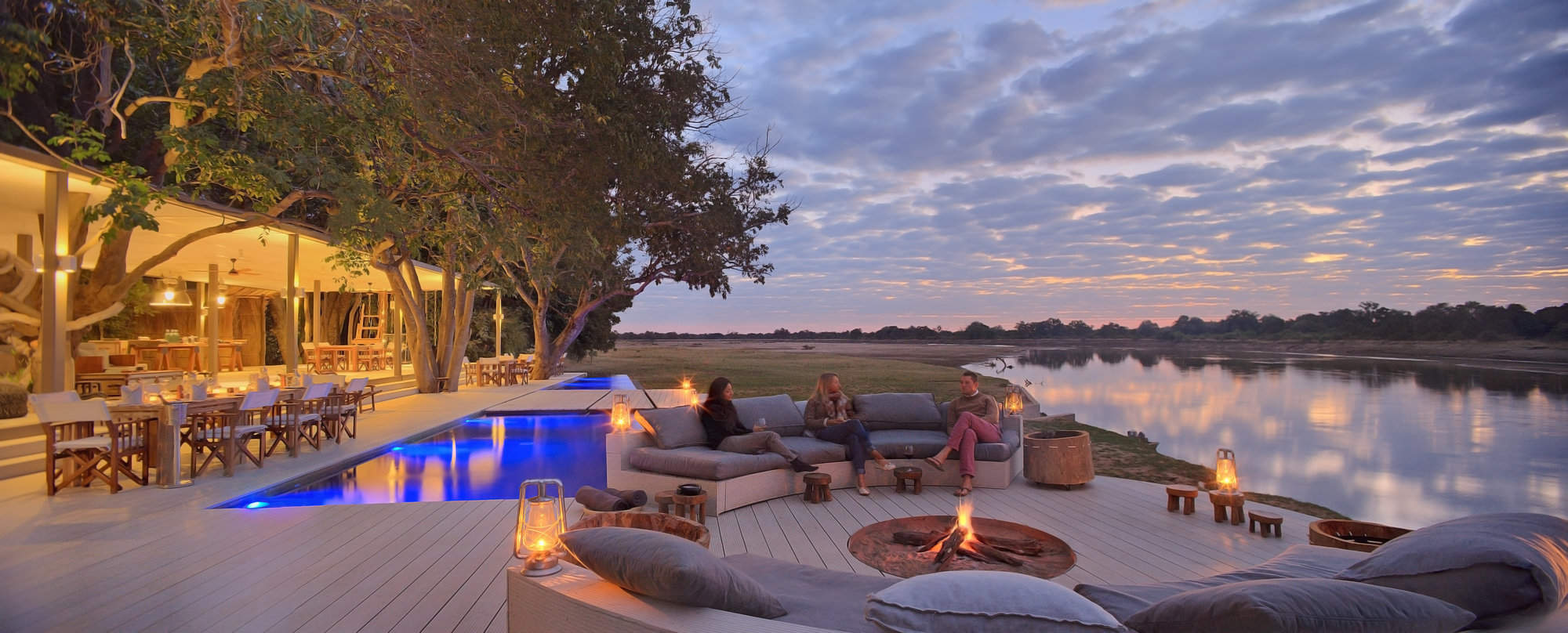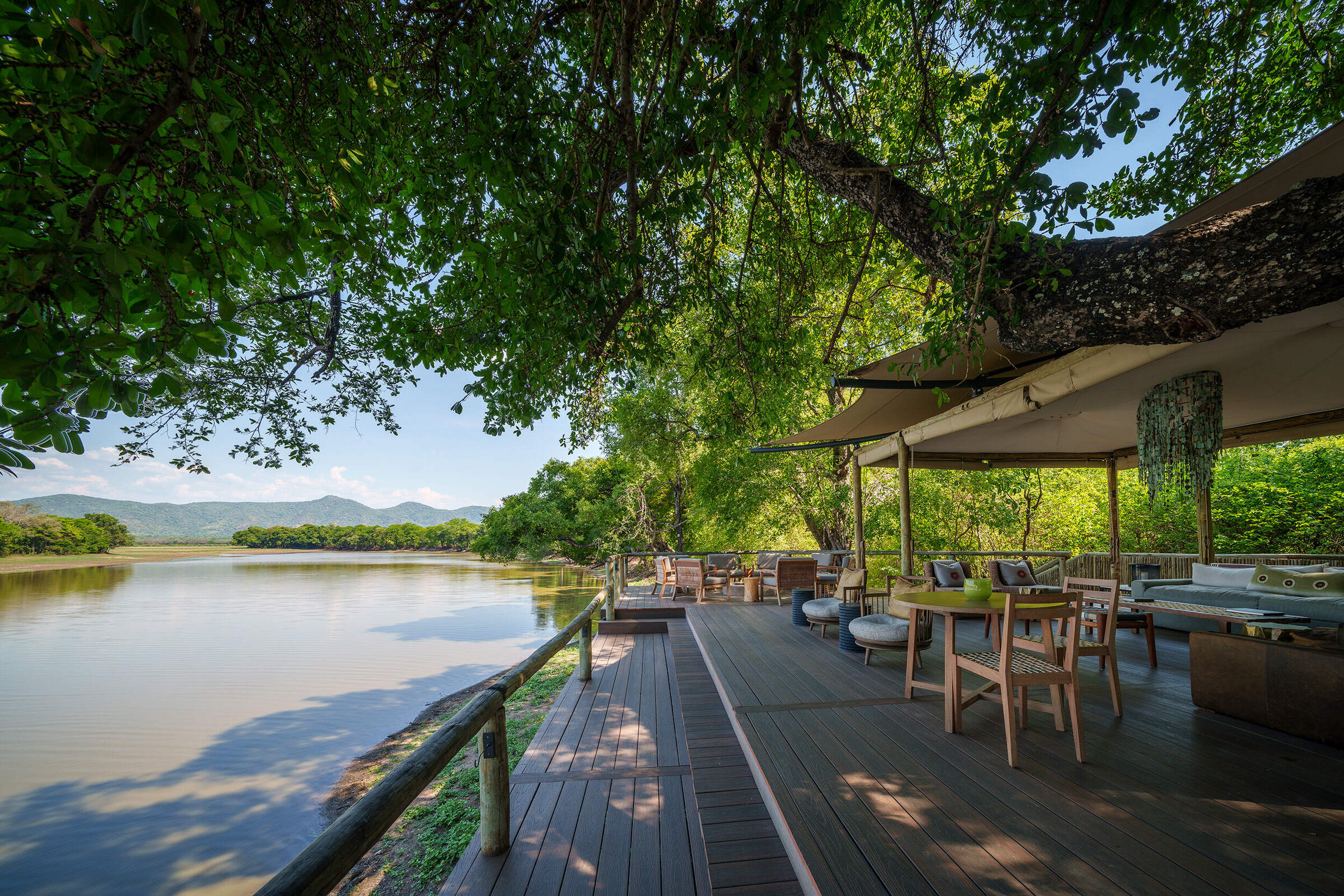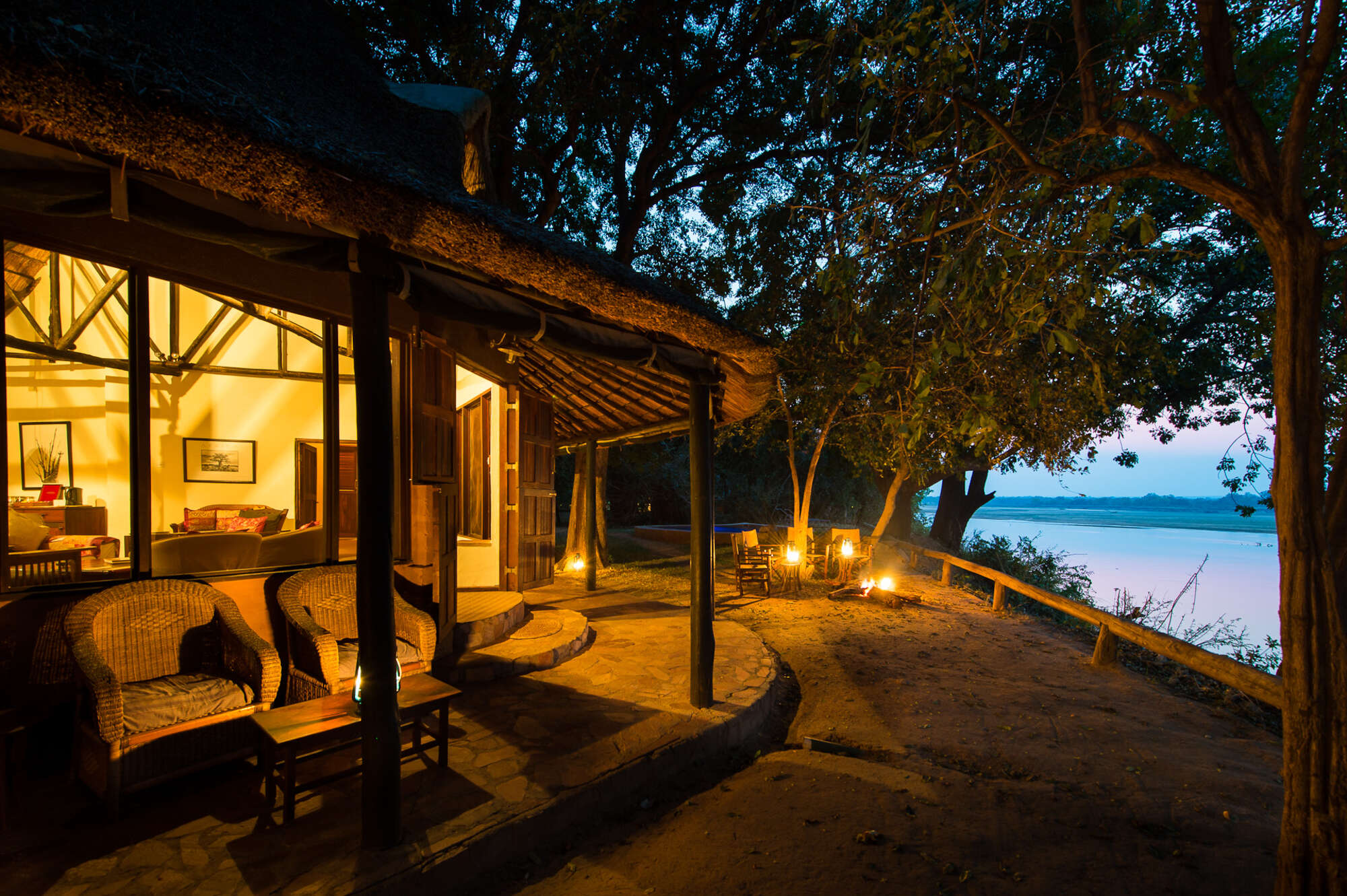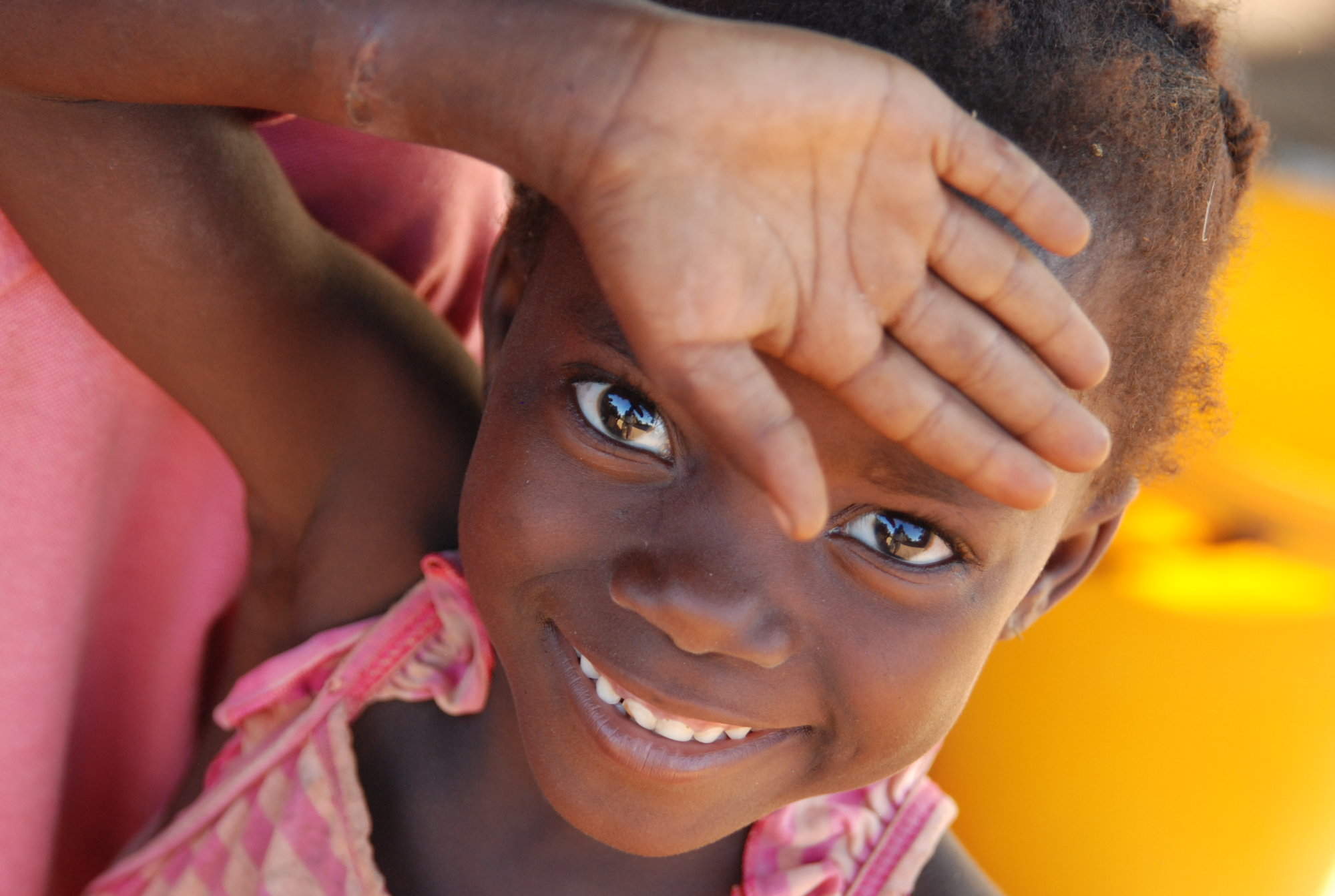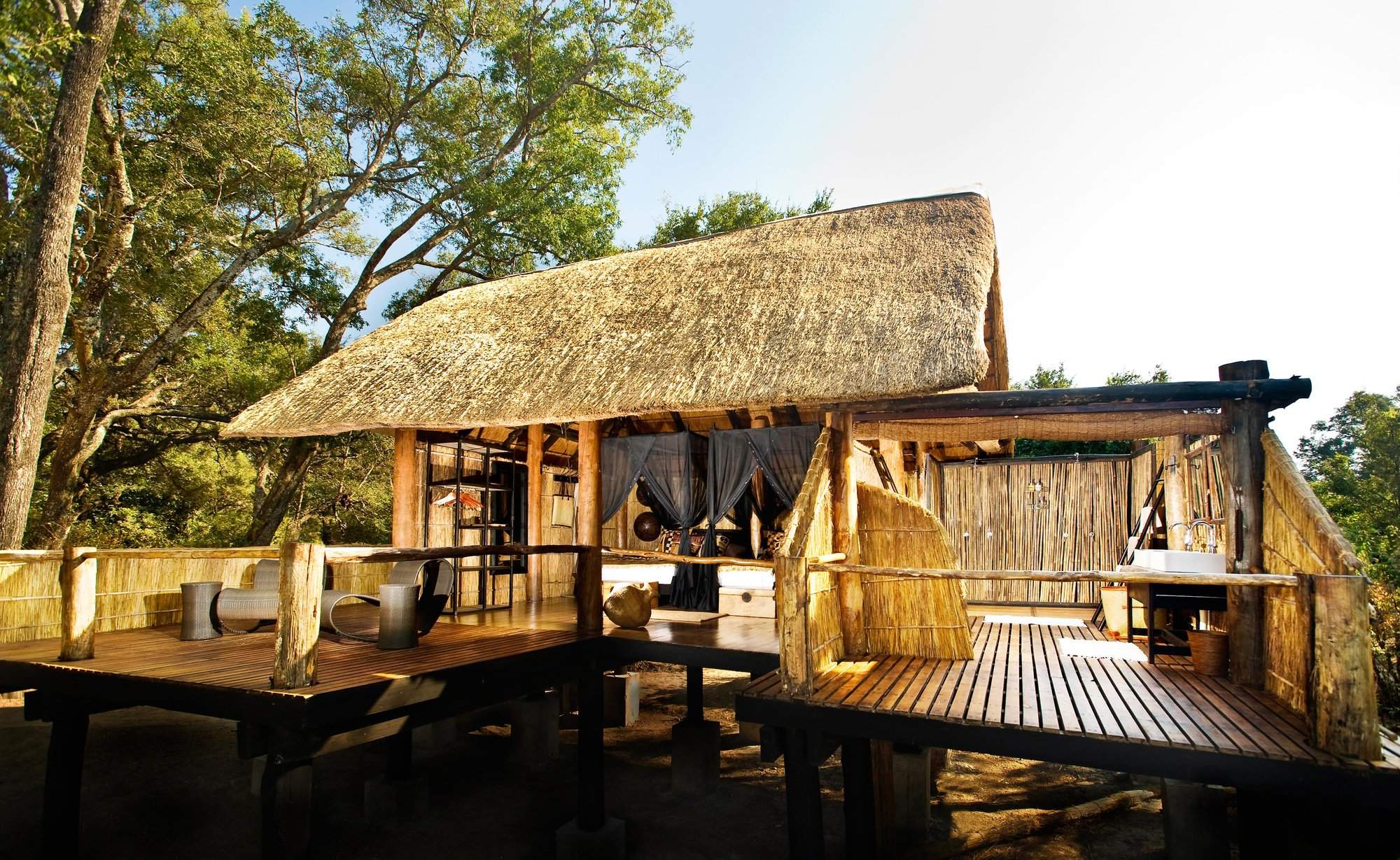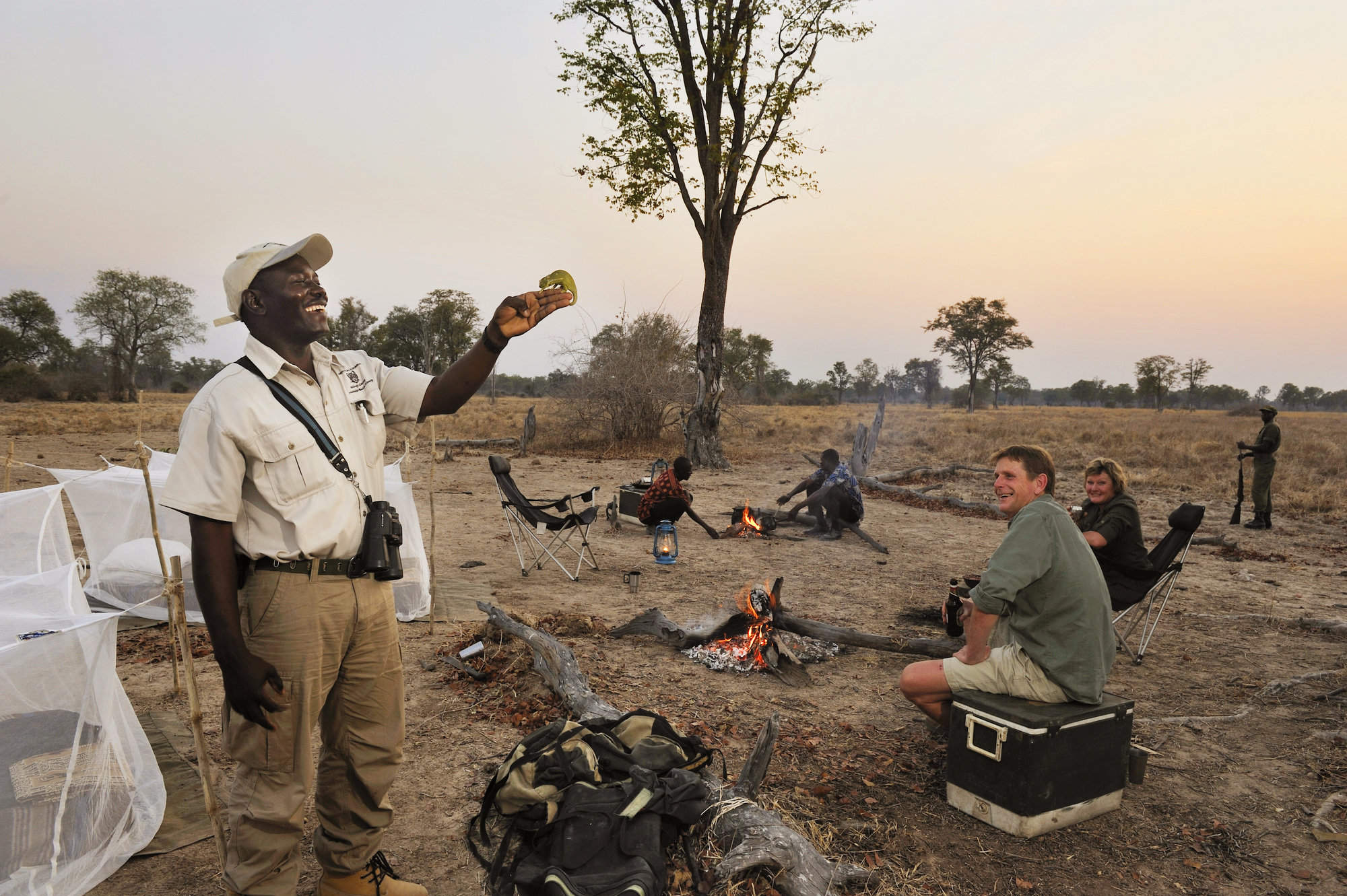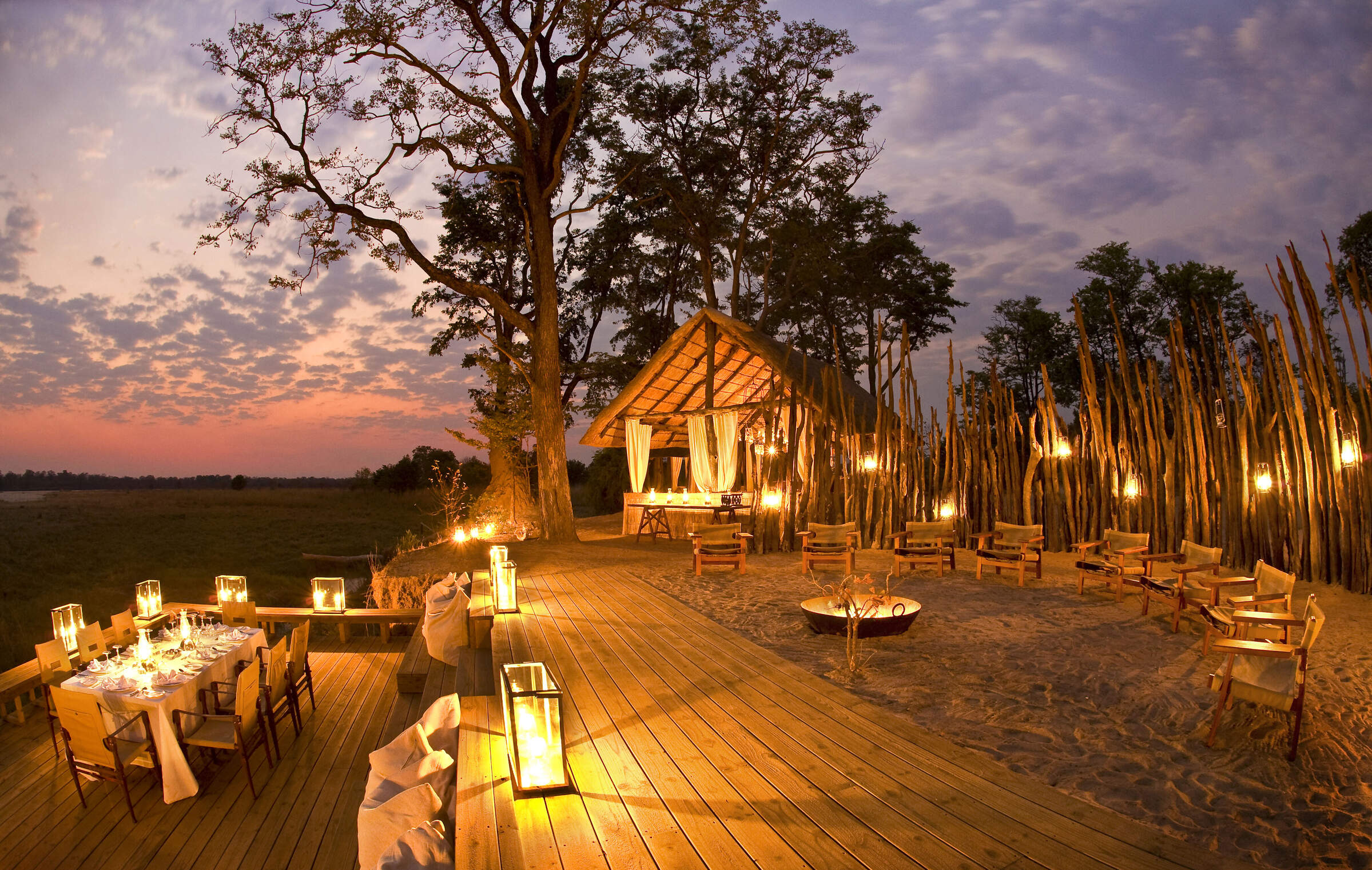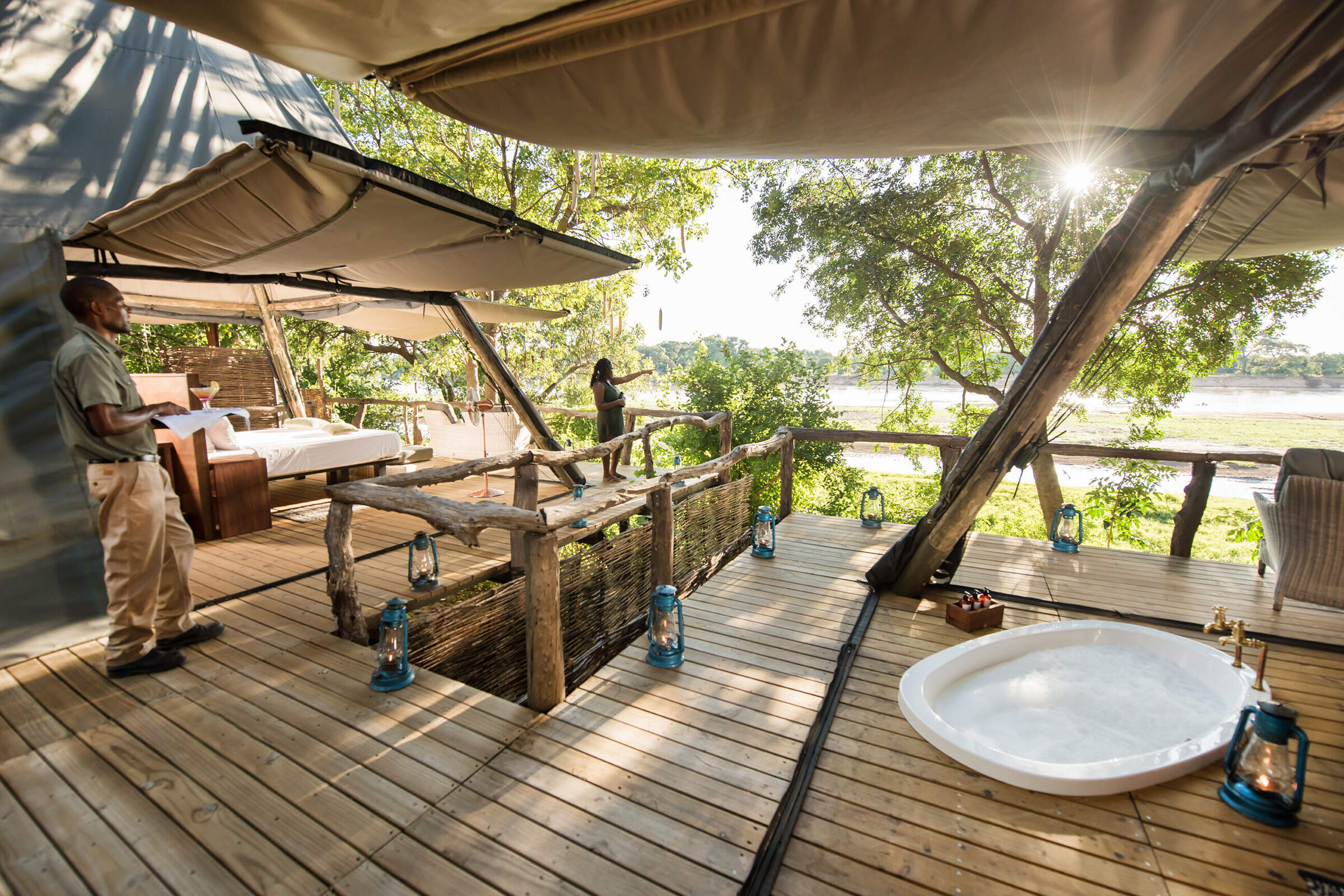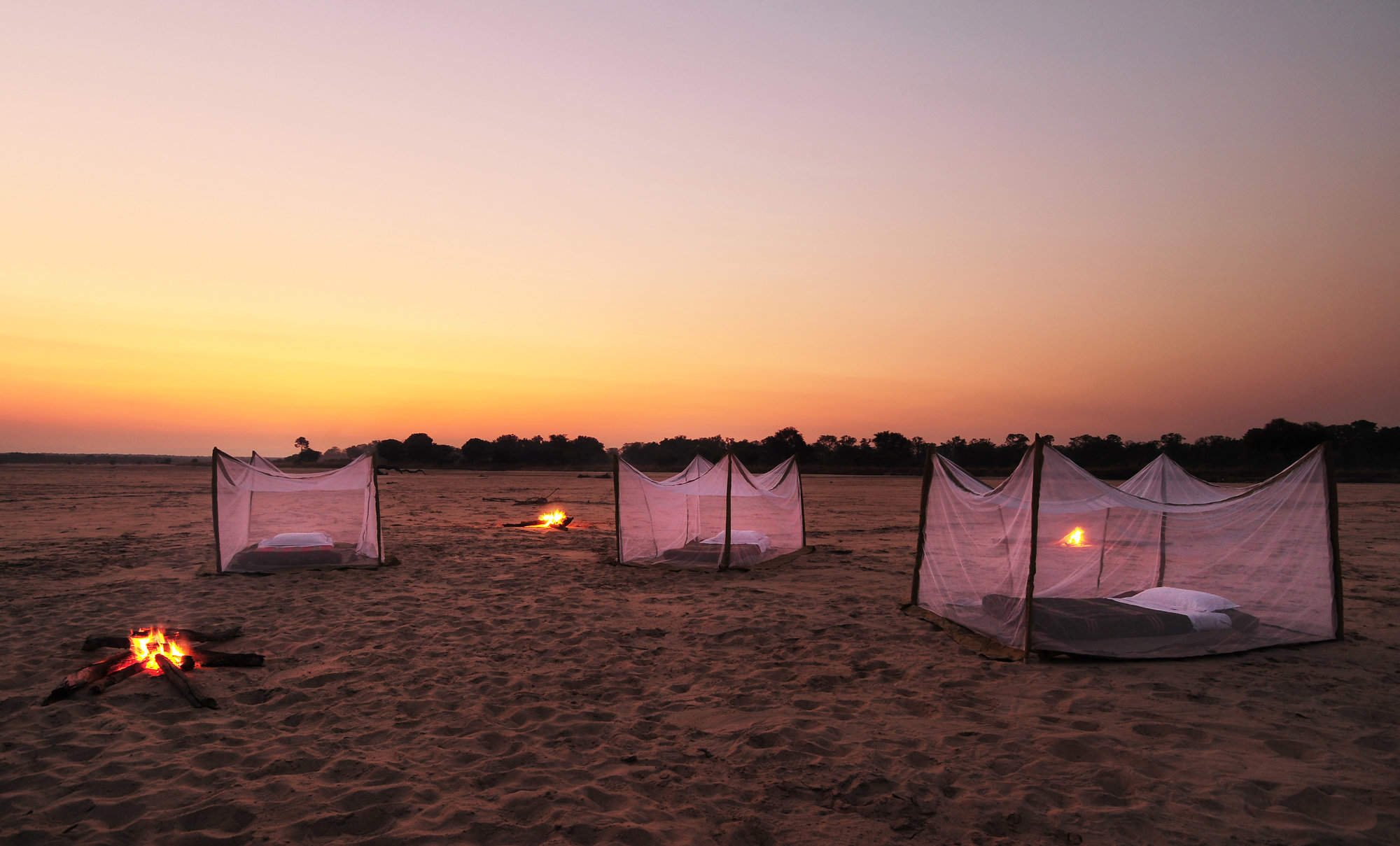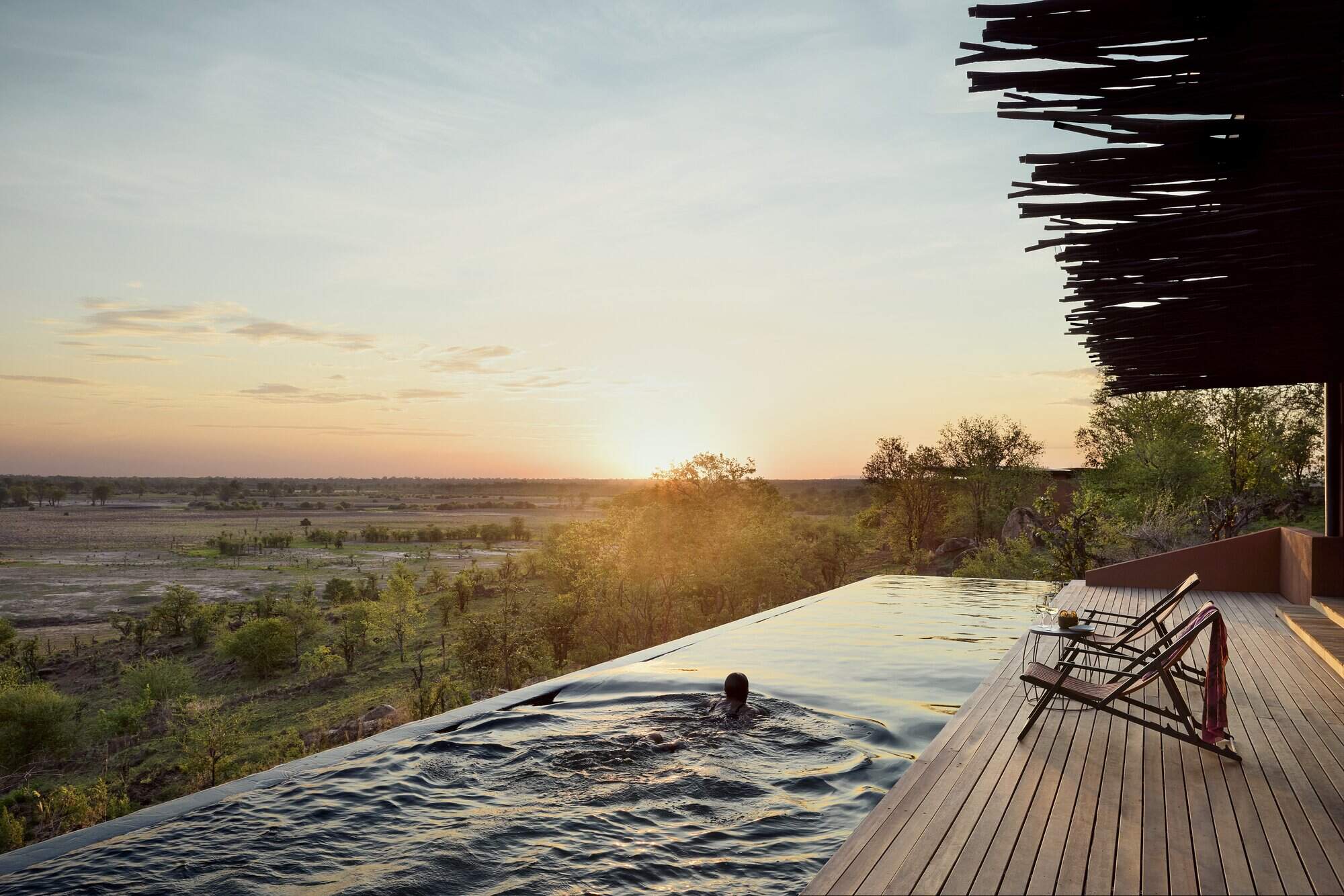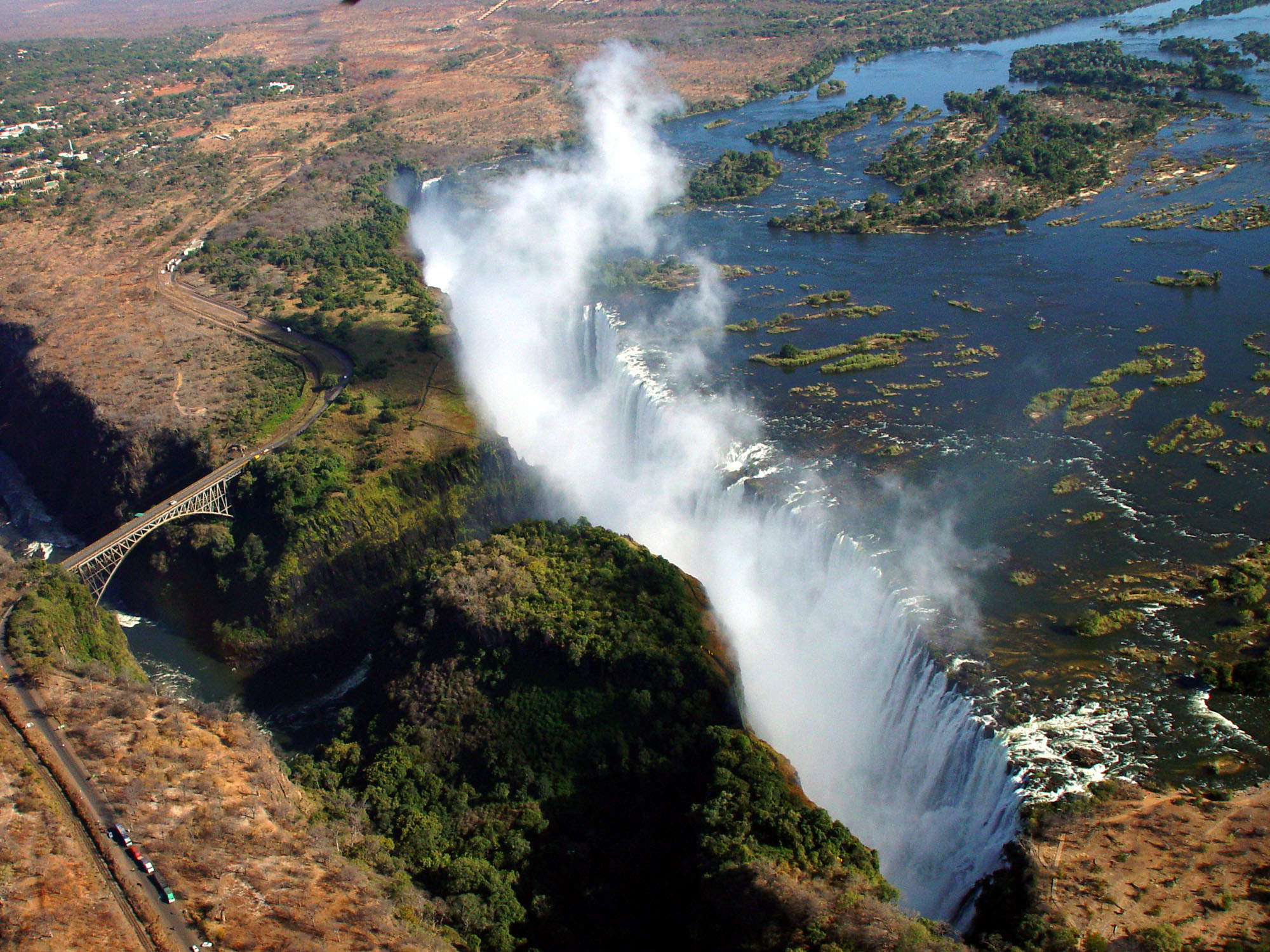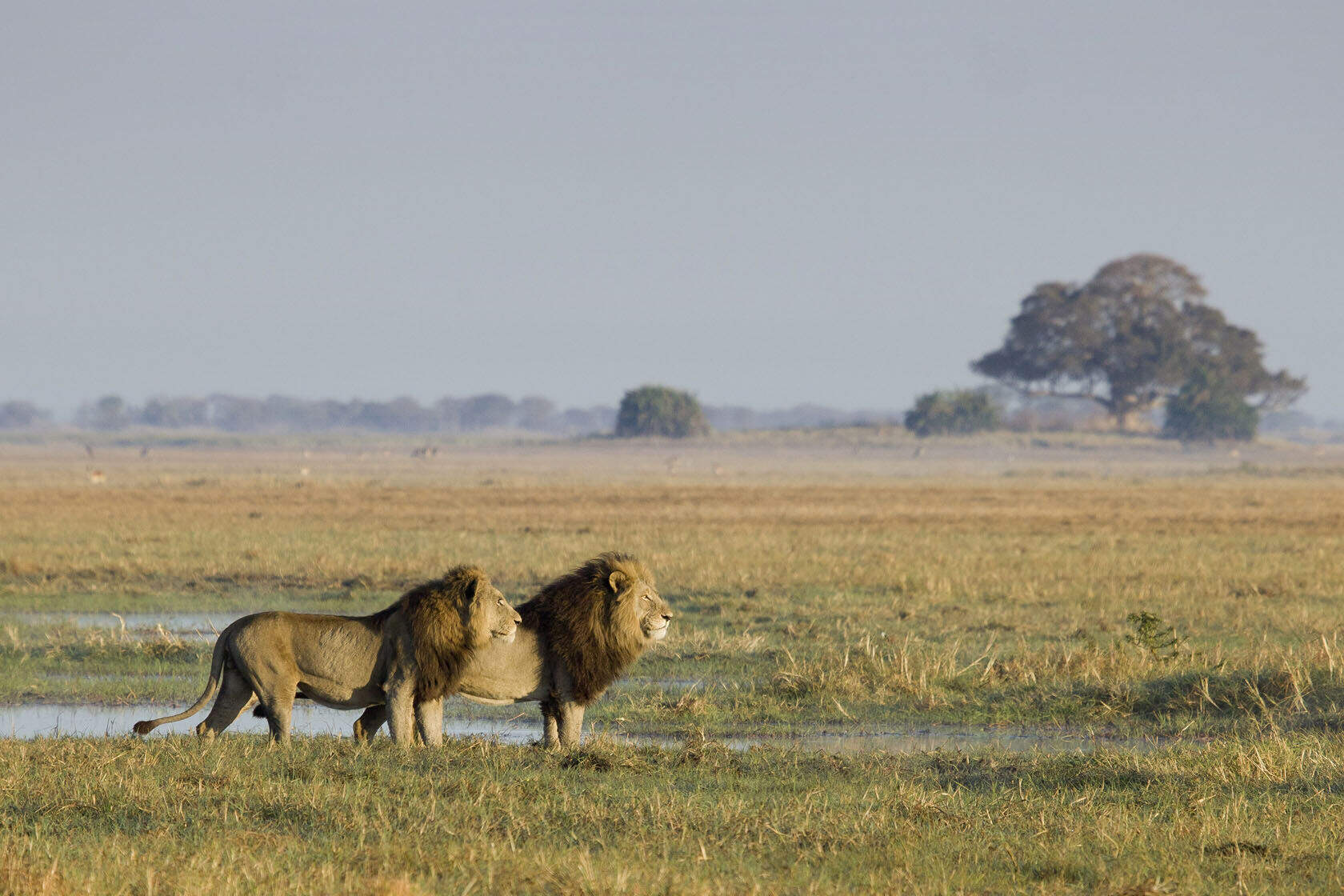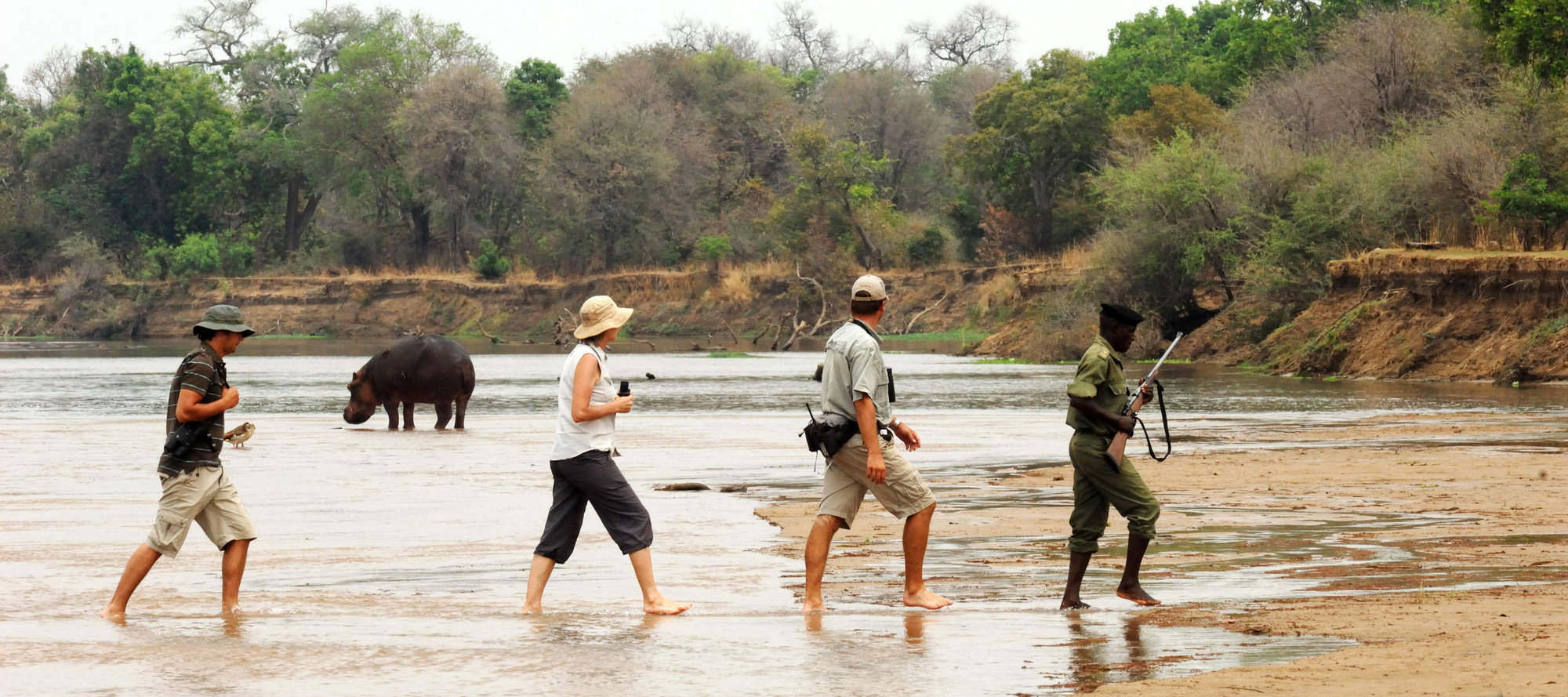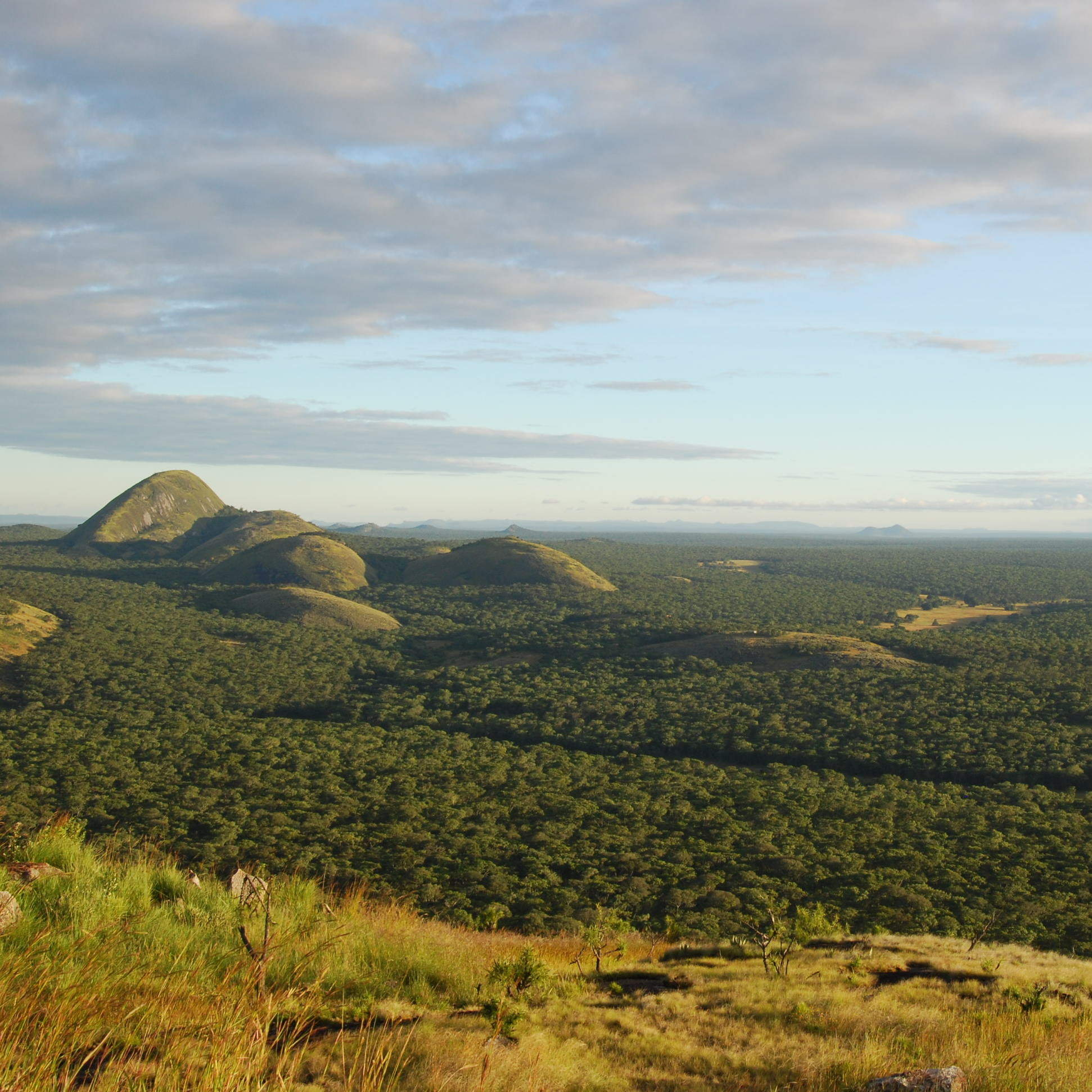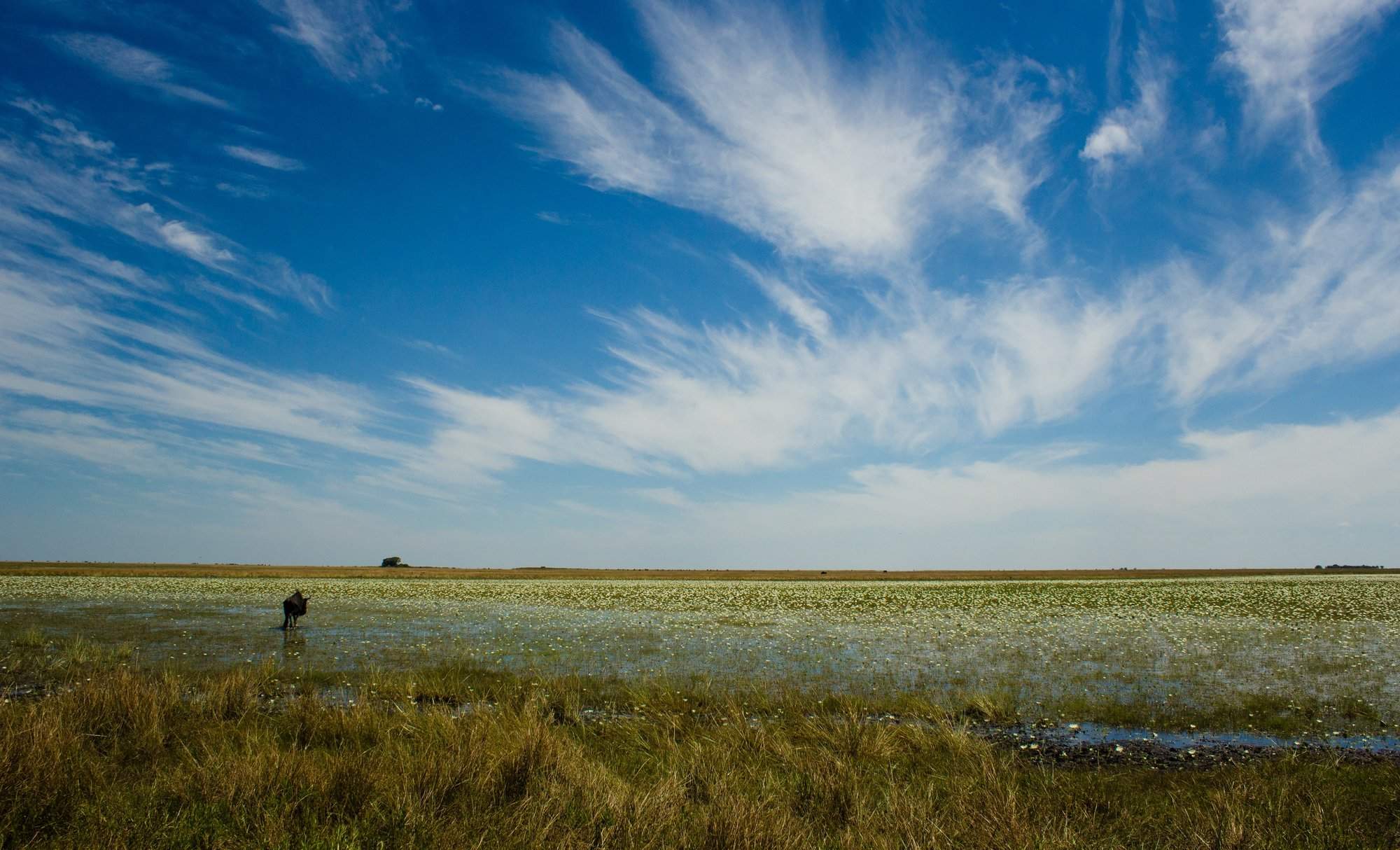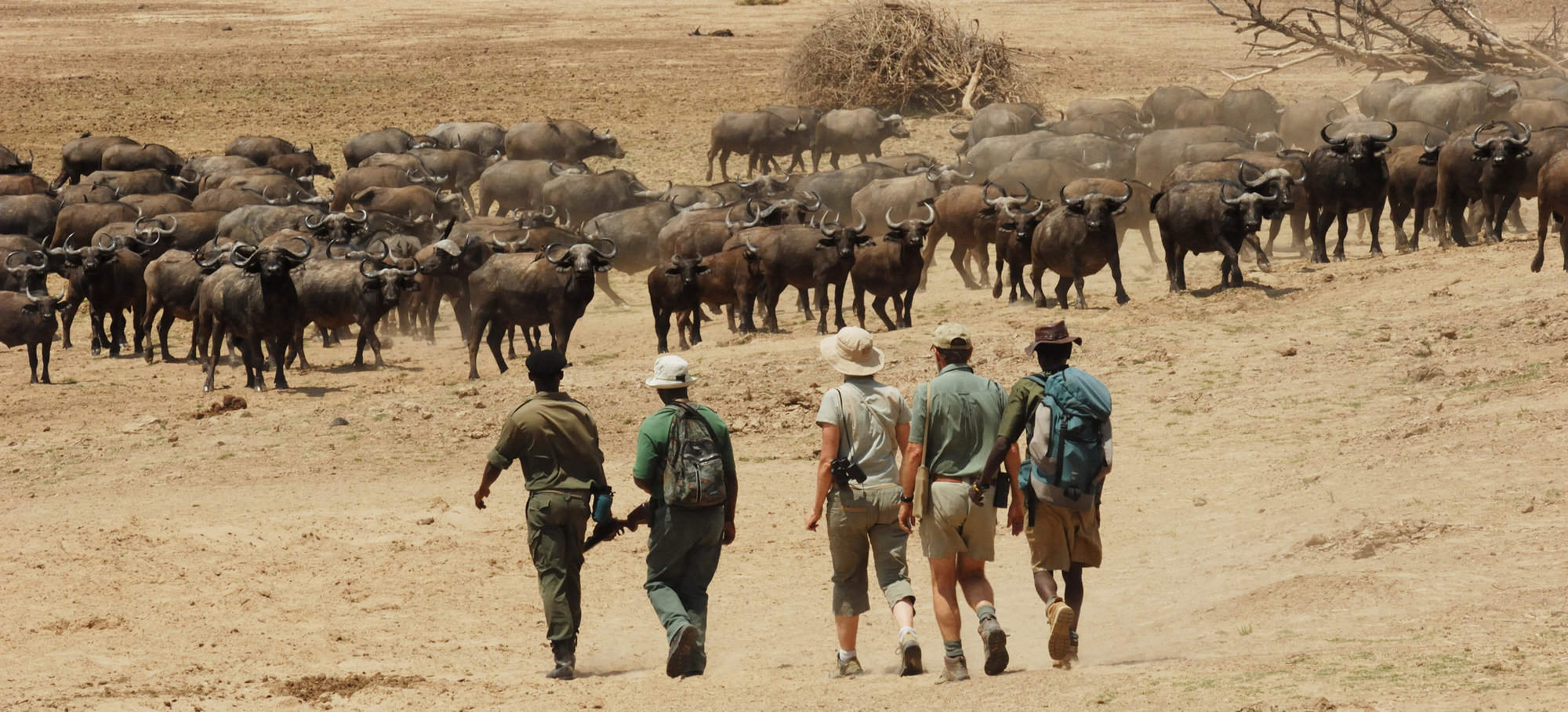Kapamba Bushcamp: Our full report
In the remote southern end of the South Luangwa National Park Kapamba Bushcamp is located on the banks of ...
... the seasonal Kapamba River. Owned by the Bushcamp Company, the camp is small and stylish, with bright colours and some contemporary furniture, and a clear North African influence in its design.Kapamba's central area is situated on the edge of the Kapamba River. Built partially of stone, it is open at the sides and front, and has a high thatched roof which makes it feel cool, even during the hotter months towards the end of the year. Wooden rafters, an earthy polished stone floor and a few contemporary, moulded chairs blend in well with the bushcamp style.
Under the thatch, the lounge area features cushioned chairs and benches, and a coffee table dotted with wildlife books and magazines. Bright cushions and Moroccan lanterns lend a modern African look. Two long wooden tables are in the dining area, but are sometimes moved outside for meals under the stars. There's also a bar, a self-serve tea and coffee station and a pizza oven which, about once a week, is fired up ready for homemade pizzas at lunchtime.
Outside, an extended wooden deck is the camp's focal point, with a seating area that makes a wonderful spot to watch the animals that come down to drink at the river. On warm evenings, this is where the dining tables are set up for a candlelit dinner.
Kapamba has just four stylish stone chalets: two with large twin beds, and two with doubles, which act as 'honeymoon suites'. That apart, the chalets are identical – all are well-designed and attractively decorated, and each has a spacious en-suite bathroom.
The bedrooms are beautifully appointed with very comfortable ‘built-in’ beds covered by large mosquito nets, modern wooden trunks, and shelves that extend out of the moulded wall. The rooms have built in solar powered lights, and portable solar lanterns also help to light the room. The full front of each chalet is completely open, and leads onto a short private veranda. At night, the front will be closed for your safety by large wrought iron gates in the shape of a spiders web, which keep out unwanted visitiors without obstructing your view of the surrounding bush.
A curved wall with a rustic woven curtain separates the bedroom from the en-suite bathroom, which has twin basins, flushing loo and – the main feature – a large sunken stone bath with enormous twin shower heads above it. These baths are massive (there's a credible story about their size being specified in centimetres, but the builders erroneously building them in inches!), though they have been cleverly designed to fill in around six minutes. In summer, when temperatures can reach 40 degrees C, guests sometimes fill their baths with cold water and use them as private plunge pools. Hot water, courtesy of a wood-burning 'donkey' boiler, is available during siesta and before dinner, but has to be requested in the morning.
The solid structure of the chalets, colourful Moroccan decorations, and huge baths mean that the style of the accommodation at Kapamba does stray from that of the more traditional camps in the area. That being said the open fronts to the chalets, thatched roofs, and small size of the camp help to retain some of the feeling of a classic bushcamp. Overall we feel that the style of the camp contrasts nicely with the surrounding environment in a way that complements it, rather than clashes with it.
Like its sister camps, Kuyenda, Chindeni, Chamilandu and Bilimungwe, Kapamba's activities are a mix of walking safaris and game drives, and it’s possible to walk between some of the camps. Generally guests will do a walk in the early morning when it’s cooler, and a drive in the afternoon, which can carry on into a night drive. There is some flexibility with this though, should you wish to go on alternative activities. There will also be at least two guides in camp when it’s full, so you will never have more than five other people on an activity with you (not including the guide or the armed scout).
On our last visit in June 2015 we were lucky enough to spot a pair of mating lions, and then on the night drive, after sundowner drinks of the banks of the Kapamba River, we were also able to spot some of Zambia’s smaller species such as the civet and the four-toed elephant shrew.
We found our morning walk the next day to be particularly good for birds, spotting several bee-eater species, green pigeons, and purple turacos. We were also able to spot some of the more notable game species from the area including the endemic Thornicroft’s giraffe, elephant, bushbuck and puku.
Our view
Kapamba Bushcamp is beautifully furnished, the staff attentive, meals good and guiding excellent. The design of the rooms is a bit more stylish and modern than a more traditional bushcamp, but it has been implemented well and still fits in well with the surrounding area. If you are looking for a really stylish bushcamp in a remote location than Kapamba would be a great choice, particularly if you combined it with one of its more rustic sister camps.
Geographics
- Location
- South Luangwa National Park, Zambia
- Ideal length of stay
- A very usual trip would be to combine Kapamba into a series of camps on this south side of the park, including a few nights at a couple of its sister camps: Kuyenda, Chindeni, Chamilandu
and Bilimungwe. However, for more variety we'd suggest that you consider combining Kapamba, and perhaps one of its sister camps, with some of the camps on the northern side of South Luangwa – perhaps Tafika or Kaingo. - Directions
- Most visitors fly from Lusaka to Mfuwe (about one hour) and then transfer by vehicle to Mfuwe Lodge (a further one hour) for a drinks/lunch/toilet stop. It's then a three-hour game drive through the park to Kapamba.
- Accessible by
- Fly-and-Transfer
Food & drink
- Usual board basis
- Full Board & Activities
- Food quality
- We’ve always found the food at Kapamba to be very good, and our last visit in June 2015 was no exception.
Before setting off on your early morning activity, a light breakfast is served at sunrise on the main deck overlooking the river. Breakfast consists of cereal, toast, muffins and fruit, along with tea, coffee and fruit juice.
A buffet lunch is served in the dining area at around 11.30am, once you've had time to freshen up after your morning activity. You can usually expect a meat dish, a choice of salads and freshly baked bread. On one of our visits, we had chicken breasts, lamb kofte, lentil salad and beetroot salad, followed by fresh melon. There was also a different variety of bread each day – our favourite was the rosemary bread.
Before the afternoon activity everyone meets on the deck at around 4.00pm for afternoon tea, accompanied by some delicious homemade cakes such as the apple crumble muffins we had on our last visit.
Sundowners are served whilst out on your game drive with a drink (or two!) of your choice and some snacks.
Guests then return to the camp for a three-course dinner at around 8.00pm. Last time we had fried houloumi with chilli jam and salad, followed by pepper steak for the main accompanied by mashed potatoes, broccoli and cauliflower. Finally for desert we had a very tasty apple and cinnamon tart with cream. - Dining style
- Group Meals
- Dining locations
- Indoor and Outdoor Dining
- Further dining info, including room service
- No.
- Drinks included
- Most drinks are included at Kapamba, but champagne, and specially imported wines and spirits would be an additional cost.
Special interests
- Honeymoons
- Kapamba’s beautiful chalets are perfect for an adventurous honeymoon in Zambia. The honeymoon ‘suites’ are private and spacious with huge baths. Private meals can also be arranged on your deck or in your room, adding to a memorable stay.
- See ideas for Honeymoons in Zambia
- Walking safaris
- Walking safaris between Kapamba and its sister camps are a great way to see Zambia on foot. A typical itinerary might start at Chamilandu, walking to Chindeni, Bilimungwe and then Kapamba. Each walk lasts around three or four hours.
- See ideas for Walking safaris in Zambia
Children
- Attitude towards children
- Children 12 years and older are welcome at Kapamba. Children under the age of 12 are welcome, by prior arrangement, if the family group takes over the whole camp. Walking in the park is not permitted for children younger than 12.
- Property’s age restrictions
- Children under the age of 12 can be accommodated at Kapamba on request but only if the family group takes over the whole camp. Walking in the park is not permitted for children younger than 12.
- Special activities & services
- None
- Equipment
- Kapamba could put an extra bed into a chalet if requested. Alternatively, their twin beds are effectively small doubles, so a child could share a chalet with its parents.
- Generally recommended for children
- The camp has an adult atmosphere and because all activities are usually done as one group, there isn’t a great deal of flexiblity with the length or type of activity done. So we wouldn’t recommend Kapamba for children under the age of 16 years.
- Notes
- The camp is unfenced and wildlife can freely wander through. Children must be under the supervision of their parents at all times.
Our travellers’ wildlife sightings from Kapamba Bushcamp
Since mid-2018, many of our travellers who stayed at Kapamba Bushcamp have kindly recorded their wildlife sightings and shared them with us. The results are below. Click an animal to see more, and here to see more on our methodology.

100% success

100% success

100% success

100% success

83% success

83% success

83% success

67% success

17% success

17% success

17% success

0% success

0% success

0% success

0% success
Communications
- Power supply notes
- There are solar powered lights in all of the rooms. There are no plug points in the rooms, though there is a charging station in the kitchen for charging electronics.
- Communications
- Kapamba has 24-hour radio contact with its sister camps in South Luangwa and with its base at Mfuwe Lodge.
- TV & radio
- None
- Water supply
- Borehole
- Water supply notes
- The bath, showers and handbasins are plumbed in. Each chalet has a flushing toilet.
Health & safety
- Malarial protection recommended
- Yes
- Medical care
- There is a doctor based at a lodge in the Mfuwe area, a few hours’ drive away. In an emergency, it is possible to arrange medical evacuation by air to Lusaka, and potentially to Johannesburg.
- Dangerous animals
- High Risk
- Security measures
- Guests are escorted between the main area and their chalets after dark by a member of the Kapamba team.
- Fire safety
- Kapamba has fire extinguishers in the main area and by every chalet.
Activities
4WD Safari
Birdwatching
Cultural excursion
Guided walking safari
Night drive
Extras
- Disabled access
- Not Possible
- Laundry facilities
- A complimentary laundry service is included. Items are hand washed by male staff and then line dried, so ladies' underwear is excluded. Washing powder is provided in the bathrooms for this purpose.
- Money
- No currency exchange is available. There are no safes in the rooms, but if you’re concerned then small items could be given to management for safe keeping.
- Accepted payment on location
- We recommend you carry US dollars or Zambian kwacha if you’d like to leave a tip. In the unlikely event that payment for anything else is needed, this would be arranged through Kapamba’s sister camp, Mfuwe Lodge.
Other lodges in South Luangwa National Park
Alternative places to stay in this same area.

